Template:DatabaseQueryUNID
| Signal type | Description | Frequency | Mode | Modulation | Bandwidth | Location | Sample Audio | Waterfall image |
|---|---|---|---|---|---|---|---|---|
| "16-Tone" Drifting FSK Signal | This signal has been spotted by Antenna101 in Sarajevo, Bosnia and Herzegovina on 10th December 2023. | 603 MHzMegaHertz (MHz) 10^6 Hz | 3 kHzKiloHertz (kHz) 10^3 Hz | 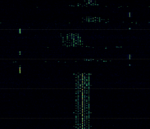 |
||||
| "The Beeps" (random name that i made up, could be pirate station) | "The Beeps" (not the actual name) is either a Belarusian-Russian military station, or a pirate. The station was first seen on 4285 kHzKiloHertz (kHz) 10^3 Hz on October 16th, 2025 at 20:16 UTC. The station is assumed to be in either Belarus or Russia because I went to an SDR in the very northern side of Poland (near Kaliningrad, Russia) and the signal was S9, compared to an SDR in southern Finland with S7. The station was only noticed for about 15 minutes until it shut off completely and hasn't been heard since. The station is made up of a background hum, probably 50 hz, and 3 beeps as the channel marker, similar to The Squeaky Wheel's channel marker back in 2008-2009. The channel marker is probably made from an analog circuit board, like The Pip's channel marker was. | 4.285 MHzMegaHertz (MHz) 10^6 Hz | 3 kHzKiloHertz (kHz) 10^3 Hz | 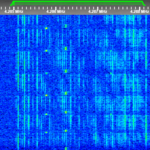 |
||||
| (RTTY?) | Somehow the Audiofile got corrupted. I'll try to add if, if it appears agian(mostly in the evening).
HAM is a new teretory for me, so please excuse me, if this is a stupid question. I've taken a look into the Database, but no signal I've seen matches the specifications for this one. This is mobitex - Arclamp, Somehow the Audiofile got corrupted. I'll try to add if, if it appears agian(mostly in the evening). HAM is a new teretory for me, so please excuse me, if this is a stupid question. I've taken a look into the Database, but no signal I've seen matches the specifications for this one. This is mobitex - Arclamp |
424.67 MHzMegaHertz (MHz) 10^6 Hz, 424.67 MHzMegaHertz (MHz) 10^6 Hz | 11 kHzKiloHertz (kHz) 10^3 Hz, 11 kHzKiloHertz (kHz) 10^3 Hz | — |  |
|||
| 10-tone signal with data bursts | unid 10-tone signal with 8psk data bursts. recorded on RHA SDR. the signal is probably from Russia. | 6.115 MHzMegaHertz (MHz) 10^6 Hz | 7 kHzKiloHertz (kHz) 10^3 Hz | 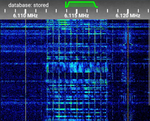 |
||||
| 145.870MHz | I couldn't get a small file of the IQQuadrature signals form the basis of complex RF signal modulation and demodulation, both in hardware and in software, as well as in complex signal analysis.. However, this frequency's always populated with evenly spaced lines of just that, and it typically forms | 145.863 MHzMegaHertz (MHz) 10^6 Hz — 145.885 MHzMegaHertz (MHz) 10^6 Hz | 30 HzHertz (Hz), unit of frequency, defined as one cycle per second (1 Hz). |  |
||||
| 147 Mhz burst type data | — | — | ||||||
| 160.282.000 in Berlin, Germany | Intersting signal found close to railways. Not sure about purpose. Might be PSKPhase-Shift Keying? | 160,282 MHzMegaHertz (MHz) 10^6 Hz — 160,282.2 MHzMegaHertz (MHz) 10^6 Hz | 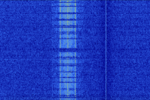 |
|||||
| 170 Hz Carriers at 70 MHz | Unknown Wideband Signal of multiple, varying, 170 HzHertz (Hz), unit of frequency, defined as one cycle per second (1 Hz). spaced-carriers. Extending over at least 69.3 - 70.6 MHzMegaHertz (MHz) 10^6 Hz | 69.35 MHzMegaHertz (MHz) 10^6 Hz — 71.56 MHzMegaHertz (MHz) 10^6 Hz |  |
|||||
| 184.320 MHz Unknown, Crystal Ocillator? | Wikipedia references this frequency on its 'Crystal Ocillator Frequencies' page;" 184.320 -- WCDMA/3G -- Used in wireless base stations; 6x 30.72 MHzMegaHertz (MHz) 10^6 Hz " but I can't find much more information about 3G Base stations on this frequency, why or what it is for. | 184.32 MHzMegaHertz (MHz) 10^6 Hz | 400 HzHertz (Hz), unit of frequency, defined as one cycle per second (1 Hz). | 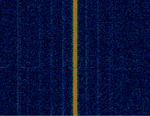 |
||||
| 2021-05-01T16 37 56Z 27105p00kHz | 27.105 MHzMegaHertz (MHz) 10^6 Hz | 12 kHzKiloHertz (kHz) 10^3 Hz | 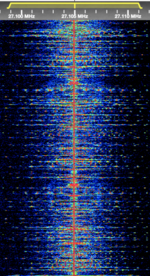 |
|||||
| 2024 May Frog like signal at 141p507 | Unidentified signal that sounds like a frog in USBUpper Side Band Modulation (Radio, referring to reception and modulation mode)Universal Serial Bus (Computer, referring to USB Ports and cables) at 141.507 MHzMegaHertz (MHz) 10^6 Hz. Spotted at May 2024 in Greece. |  |
||||||
| 236 MHZ pulses | like a half sine pulses | 236 MHzMegaHertz (MHz) 10^6 Hz | 2 kHzKiloHertz (kHz) 10^3 Hz | 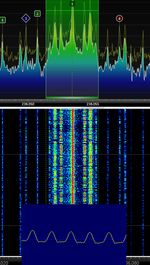 |
||||
| 260,722 MHz | Continuous signal with FHSS "Waterdroplets" | 260.722 MHzMegaHertz (MHz) 10^6 Hz | 20 kHzKiloHertz (kHz) 10^3 Hz |  |
||||
| 2740 MHz - US Weather Radar - WSR-88D??? | Unknown Signal | 2,740 MHzMegaHertz (MHz) 10^6 Hz, 2,740 MHzMegaHertz (MHz) 10^6 Hz | 5 MHzMegaHertz (MHz) 10^6 Hz | — |  |
|||
| 3790KHz unidentified signal | Received by luck on 3790KHz on after midnight of September 08 and September 09 2020 (Greece time). | 3.79 MHzMegaHertz (MHz) 10^6 Hz | 3 kHzKiloHertz (kHz) 10^3 Hz | |||||
| 3905 Khz | Received this between 18-18:05 UTC on the 16th January 2018 | 3.905 MHzMegaHertz (MHz) 10^6 Hz, 3.905 MHzMegaHertz (MHz) 10^6 Hz | — | |||||
| 40M pulsing spark gap lijke QRN every night continuing until daylight | 40M pulsing spark gap like QRN | 7.1 MHzMegaHertz (MHz) 10^6 Hz | 200 kHzKiloHertz (kHz) 10^3 Hz | |||||
| 421.850 during Tour de France | Unknown signal received during Tour de France near Paris. Signal looks like APT, but sure it is not. | 421.85 MHzMegaHertz (MHz) 10^6 Hz | 18 kHzKiloHertz (kHz) 10^3 Hz | 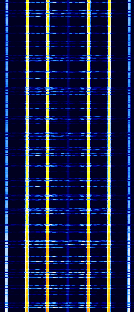 |
||||
| 433p90 | Repeating signal. seems like a wireless keyboard, bge power meter, or a comcast xr2 remote | 433.9 MHzMegaHertz (MHz) 10^6 Hz | 433.8 MHzMegaHertz (MHz) 10^6 Hz — 433.95 MHzMegaHertz (MHz) 10^6 Hz |  |
||||
| 433p920 | Rapid data bursts. two seem to be playing consecutively. Most likely a low-powered general use signal for consumer remote-control items. | 433.92 MHzMegaHertz (MHz) 10^6 Hz | ||||||
| 444, 275 MHz | 43.723 MHzMegaHertz (MHz) 10^6 Hz — 444.275 MHzMegaHertz (MHz) 10^6 Hz | 20 kHzKiloHertz (kHz) 10^3 Hz | 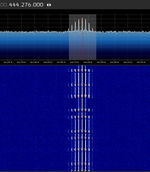 |
|||||
| 479.999 Uknown Beeping Signal | Found this signal on 479.999.810 MHzMegaHertz (MHz) 10^6 Hz. It is constantly transmitting on this frequency. I don't really know if it is a USBUpper Side Band Modulation (Radio, referring to reception and modulation mode)Universal Serial Bus (Computer, referring to USB Ports and cables) modulation or not. | 479.999 MHzMegaHertz (MHz) 10^6 Hz | 1.3 MHzMegaHertz (MHz) 10^6 Hz | 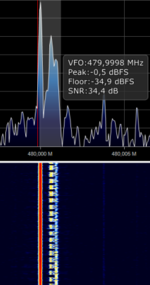 |
||||
| 7047khz Unknown signal | It could be a signal from Russian CISCommonwealth of Independent States (CIS), the former Soviet Republic,Receive Flydog SDR in the UK | 7.047 MHzMegaHertz (MHz) 10^6 Hz | 2.4 kHzKiloHertz (kHz) 10^3 Hz | 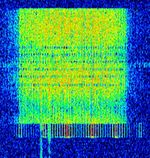 |
||||
| 80 Meter Unknown | I get this signal from 3.0 MHzMegaHertz (MHz) 10^6 Hz through 6.5 MHzMegaHertz (MHz) 10^6 Hz about 480 KHzKiloHertz (kHz) 10^3 Hz apart Any Idea what it might be? | 3 MHzMegaHertz (MHz) 10^6 Hz — 6.5 MHzMegaHertz (MHz) 10^6 Hz |  |
|||||
| 863p151p150 | 863.151 MHzMegaHertz (MHz) 10^6 Hz | 142 kHzKiloHertz (kHz) 10^3 Hz |  |
|||||
| 869.525 | 130 kHzKiloHertz (kHz) 10^3 Hz | |||||||
| ?? satellite maybe? | RTTYRadio TeleTYpe | 0 HzHertz (Hz), unit of frequency, defined as one cycle per second (1 Hz). | 0 HzHertz (Hz), unit of frequency, defined as one cycle per second (1 Hz). | — | ||||
| A bunch of alternating tones.. | I found this while scanning around the military air band with my SDR, and about midway through the audio file, you can hear something that sounds like a modem, very odd. There are also more than one of them on the band, on several different frequencies. Never heard anything like it. | 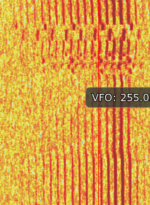 |
||||||
| AM Test | Recorded via Twente SDR (Enschede, Netherlands). | 3.985 MHzMegaHertz (MHz) 10^6 Hz | 10 kHzKiloHertz (kHz) 10^3 Hz | — | 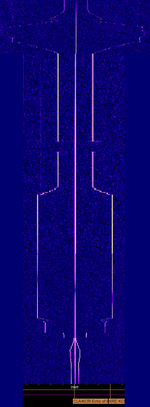 |
|||
| AM signal | Signal appeared on AMAmplitude Modulation band in March. At that time it was covering 580 kHzKiloHertz (kHz) 10^3 Hz to about 1160 kHzKiloHertz (kHz) 10^3 Hz strongest at 900 kHzKiloHertz (kHz) 10^3 Hz. It disappeared for a time and returned in August at less strength. Can be heard for about 8 miles to the north. We are on the ocean, so unknown how far in that direction. | 0 HzHertz (Hz), unit of frequency, defined as one cycle per second (1 Hz). | 0 HzHertz (Hz), unit of frequency, defined as one cycle per second (1 Hz). | — | ||||
| Anomalous Russian signal | Received a Russian? CQ call but the antenna was only a small Y/B LED hooked up to test the radio. I tried to get a recording but the event (around 7am) lasted only a few seconds. Seemed very narrow band though and I did some fine tuning to try and optimize it, in retrospect should have got a screen shot. | 28.469 MHzMegaHertz (MHz) 10^6 Hz | 25 kHzKiloHertz (kHz) 10^3 Hz | — | — | |||
| Beeping morse-like signal found on 599p99 MHz | Beeping morse-like signal at 299,995MHz found in Lisbon, Portugal. Using stock antenna from RTL820T2 RTL dongle and SDR#. | 299.995 MHzMegaHertz (MHz) 10^6 Hz | 350 HzHertz (Hz), unit of frequency, defined as one cycle per second (1 Hz). | 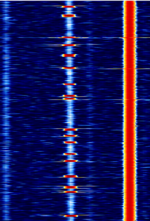 |
||||
| Bermuda 460.100MHz | Recorded in Bermuda on 460.100Mhz. I believe it may be an MPT system? | 460.1 MHzMegaHertz (MHz) 10^6 Hz | — | |||||
| Bird Signal | Appeared in 2021 then transmitted every day until it stopped around 4 months ago Sends weird distorted noises | 445.3 MHzMegaHertz (MHz) 10^6 Hz | 12.5 kHzKiloHertz (kHz) 10^3 Hz | — | ||||
| Bird Song Oddity | Here is an Oddity Station heard on the WebSDR at the University of Twente that transmitted a loop of birds chirping. This recording is from May 16 2016. It occurred during the nights. Some say it may have been from Germany. Last heard around April 2017. | 6.965 kHzKiloHertz (kHz) 10^3 Hz — 6.985 kHzKiloHertz (kHz) 10^3 Hz | — | |||||
| Bonaire | — | |||||||
| Broadcast FM Whistling | I was scanning FMFrequency Modulation radios when suddenly I found this. Possible solution: Hobbyist single-transistor tracking transmitter. | 102 MHzMegaHertz (MHz) 10^6 Hz | 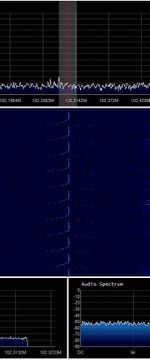 |
|||||
| Buzzing | 14 HzHertz (Hz), unit of frequency, defined as one cycle per second (1 Hz). | — |  |
|||||
| C4FM modulation + DSD | Hello, I'm attempting to decode local police communication with GQRX and DSD. DSD is receiving the audio from GQRX fine, however it reports many errors when decoding. Comparing what I capture from my SDR from other examples on the internet, it seems the speed of the transmission I receive is slower than normal. I want to say the baudBaud (unit symbol Bd) is the unit for symbol rate or modulation rate in symbols per second. rate of the local police transmission is lower than normal. I could be wrong on that as I am new to this. Any help/tips would be appreciated. Thanks. | — | ||||||
| CB Radio | The radio with happy new year melody and human voice | 27.111 MHzMegaHertz (MHz) 10^6 Hz — 27.114 MHzMegaHertz (MHz) 10^6 Hz | 25 kHzKiloHertz (kHz) 10^3 Hz | 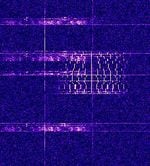 |
||||
| CIS-5275 | 1200Bd BPSKBinary Phase-Shift Keying (1 bit per symbol)? bw 1.4 kHzKiloHertz (kHz) 10^3 Hz signal from Russia on 5275 kHzKiloHertz (kHz) 10^3 Hz | 5.275 MHzMegaHertz (MHz) 10^6 Hz | 1.4 kHzKiloHertz (kHz) 10^3 Hz | 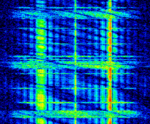 |
||||
| CTCSS Alone | Double CTCSS Code | 28.08 MHzMegaHertz (MHz) 10^6 Hz | 120 kHzKiloHertz (kHz) 10^3 Hz | — |  |
|||
| Canada 155.325 | 155 HzHertz (Hz), unit of frequency, defined as one cycle per second (1 Hz). | — | ||||||
| Constant beeping sound | Constant beeping noise. Does not emmit any sound on other modes than CWContinuous Wave. | 296.69 MHzMegaHertz (MHz) 10^6 Hz | 760 HzHertz (Hz), unit of frequency, defined as one cycle per second (1 Hz). | 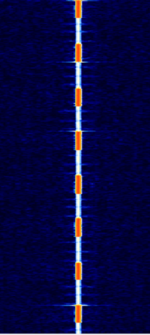 |
||||
| Constantly repeating signal | 419.324 MHzMegaHertz (MHz) 10^6 Hz | 16 kHzKiloHertz (kHz) 10^3 Hz | 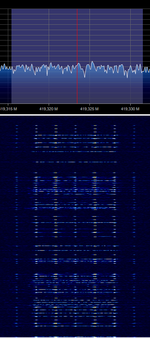 |
|||||
| Continu signal on 423Mhz since today 20/01/21 | A continuously signal with a twisting waterfall
Bandwidth 12.5Khz The audio file is RAW |
423.425 MHzMegaHertz (MHz) 10^6 Hz | 6 kHzKiloHertz (kHz) 10^3 Hz | 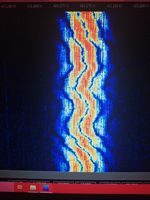 |
||||
| Continuously signal on 424.493Mhz | continuous signal on 2 different frequencies : 424.493Mhz and 424.793Mhz <-(on this frequency is the sound just a little slower) i think it has something to do with the public buscompany | 424 MHzMegaHertz (MHz) 10^6 Hz | 10 kHzKiloHertz (kHz) 10^3 Hz | 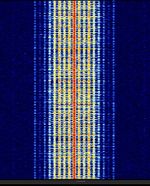 |
||||
| DNA-like shifting frequencies signal | It shows up as several mirror-images throughout the spectrum, some very close to each other, all of them exact copies of the original signal | 800 MHzMegaHertz (MHz) 10^6 Hz — 900 MHzMegaHertz (MHz) 10^6 Hz | — | 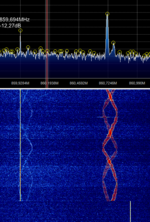 |
||||
| DVI interference | DVI interference from my old screen (around 2009) | 5,094 MHzMegaHertz (MHz) 10^6 Hz | 0 HzHertz (Hz), unit of frequency, defined as one cycle per second (1 Hz). |  |
||||
| Digital code in UHF | Tuner: Rtl-Sdr (RTL2832U+R820T2 100KHz 1.7GHz)
Antenna: TV antenna (ASP-8S) Software: SDR# Frequency: 447.772.200 HZ Signal period: 0-24 |
447.722 MHzMegaHertz (MHz) 10^6 Hz | 13.49 kHzKiloHertz (kHz) 10^3 Hz | 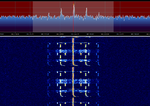 |
||||
| Digital radio | Undecodeable digital intercom signals and digital repeater signals | 422.7 MHzMegaHertz (MHz) 10^6 Hz | — | |||||
| Dot Signal | Can be heard on any SDR Reciever,radio,even FMFrequency Modulation radio. | 100 HzHertz (Hz), unit of frequency, defined as one cycle per second (1 Hz). — 6.666 kHzKiloHertz (kHz) 10^3 Hz | 0 HzHertz (Hz), unit of frequency, defined as one cycle per second (1 Hz). | |||||
| Dupliate of MPT1327 | 165 MHzMegaHertz (MHz) 10^6 Hz | 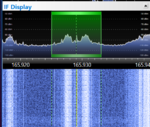 |
||||||
| EU Baby Monitor | This is a baby monitor located on the European ISM band. Most likely the data being transferred in an USBUpper Side Band Modulation (Radio, referring to reception and modulation mode)Universal Serial Bus (Computer, referring to USB Ports and cables) modulation | 864.95 MHzMegaHertz (MHz) 10^6 Hz | 6.31 kHzKiloHertz (kHz) 10^3 Hz |  |
||||
| Electronic bagpipes | I first heard this signal today, 11/28/2019 on 169.344.500 MHzMegaHertz (MHz) 10^6 Hz using HackRF SDR fed with a discone antenna, demodulated using SDR Console 3. It seems to be continuous over the span of half an hour. I have no idea what it may be, I heard a similar signal on 460.0500 MHzMegaHertz (MHz) 10^6 Hz on scanner. | 169.345 MHzMegaHertz (MHz) 10^6 Hz | 16 kHzKiloHertz (kHz) 10^3 Hz | 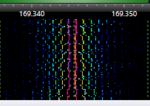 |
||||
| Elevator Interference | 3.9 kHzKiloHertz (kHz) 10^3 Hz | 2 MHzMegaHertz (MHz) 10^6 Hz | — | 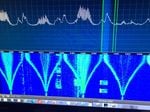 |
||||
| Errant Signal on 2m Ham Band | Errant signal spread across the 2m ham band. Local interference ruled out. | 147.455 MHzMegaHertz (MHz) 10^6 Hz |  |
|||||
| Exotic Cipher | An exotic polytone data type. | 6.215 kHzKiloHertz (kHz) 10^3 Hz | — | |||||
| FRN Gateway Data 27Mhz unid | FRN Gateway Data 27Mhz unid FFSKFast Frequency-Shift Keying Data Signal | 27 MHzMegaHertz (MHz) 10^6 Hz — 446 MHzMegaHertz (MHz) 10^6 Hz | — | |||||
| FSK Data Rollercoaster | Recording using USBUpper Side Band Modulation (Radio, referring to reception and modulation mode)Universal Serial Bus (Computer, referring to USB Ports and cables); baby monitor system is NFMNarrowband Frequency Modulation. | 864.878 MHzMegaHertz (MHz) 10^6 Hz | 32 kHzKiloHertz (kHz) 10^3 Hz | 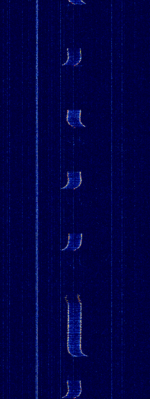 |
||||
| FSK Signal | I was looking at a websdr when I found this odd signal. | 6.94 MHzMegaHertz (MHz) 10^6 Hz | 6.94 MHzMegaHertz (MHz) 10^6 Hz | 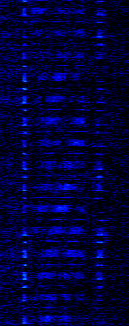 |
||||
| FSK? | It looks like some type of FSKFrequency-Shift Keying signal on 409.300 MHzMegaHertz (MHz) 10^6 Hz. Probably some telemetry. | 409.3 MHzMegaHertz (MHz) 10^6 Hz | 7.5 kHzKiloHertz (kHz) 10^3 Hz | 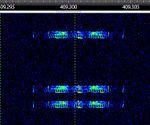 |
||||
| Found in Kings Beach,CA near 315mhz | Found while driving through King's Beach,
CA. [1] Relatively weak, visibly disperses over the ~2-4 miles driven during the waterfall recording. (FYI the bursts near 315mhz, are just TPMS messages, as we were driving...) |
314 MHzMegaHertz (MHz) 10^6 Hz — 315 MHzMegaHertz (MHz) 10^6 Hz | — |  |
||||
| Frequency Drifting Data Transmission | Unknown signal that constantly drifts in frequency between 13.795Mhz - 13.830Mhz, I'd like to learn what it is. Recorded in USBUpper Side Band Modulation (Radio, referring to reception and modulation mode)Universal Serial Bus (Computer, referring to USB Ports and cables) modulation. | 13.795 MHzMegaHertz (MHz) 10^6 Hz — 13.83 MHzMegaHertz (MHz) 10^6 Hz | 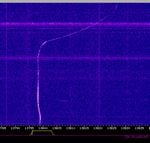 |
|||||
| Gas Meter Signal? | I received this signal when I was looking on my waterfall, looking for DMR signals. I thought it was voice initially, but when I tuned to it, it turned out to be a strange signal, that I've not seen before. It's constant, but sometimes it seems like it's fading out but the signal's always there. | 0 HzHertz (Hz), unit of frequency, defined as one cycle per second (1 Hz). | 0 HzHertz (Hz), unit of frequency, defined as one cycle per second (1 Hz). | 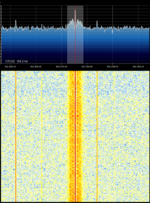 |
||||
| Generator Signal | This signal only appears on 464,000 kHzKiloHertz (kHz) 10^3 Hz | 0 HzHertz (Hz), unit of frequency, defined as one cycle per second (1 Hz). — 464 HzHertz (Hz), unit of frequency, defined as one cycle per second (1 Hz). | 0 HzHertz (Hz), unit of frequency, defined as one cycle per second (1 Hz). | 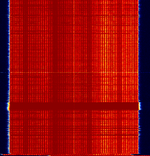 |
||||
| Giant Band of Signal | 1 MHzMegaHertz (MHz) 10^6 Hz — 2 MHzMegaHertz (MHz) 10^6 Hz | 1 MHzMegaHertz (MHz) 10^6 Hz |  |
|||||
| HF trading link '350 Hz idle tone' | Believed to be a HFHigh Frequency (3-30 MHz) trading link in idle state. Has a 350 HzHertz (Hz), unit of frequency, defined as one cycle per second (1 Hz). tone when demodulated. Resembles a radar. | 9.175 MHzMegaHertz (MHz) 10^6 Hz — 20.9 MHzMegaHertz (MHz) 10^6 Hz | 40 kHzKiloHertz (kHz) 10^3 Hz | 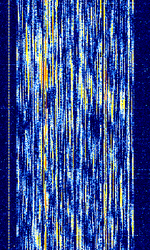 |
||||
| Ham Band Interference | This is ALWAYS here, but much less strong at night. | 0 HzHertz (Hz), unit of frequency, defined as one cycle per second (1 Hz). | 0 HzHertz (Hz), unit of frequency, defined as one cycle per second (1 Hz). | — |  |
|||
| Hoxter ABRA 6 Fireplace Control | Digital transmission of temperature and status of HOXTER fire-burning control ABRA 6. | 433.219 MHzMegaHertz (MHz) 10^6 Hz | 6 kHzKiloHertz (kHz) 10^3 Hz | — | 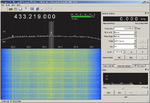 |
|||
| I am constantly geting this wave | it is usually seen 4-5 times daily with a duration about 30 min. | 0 HzHertz (Hz), unit of frequency, defined as one cycle per second (1 Hz). | 0 HzHertz (Hz), unit of frequency, defined as one cycle per second (1 Hz). |  |
||||
| I have no idea what this is | 865 MHzMegaHertz (MHz) 10^6 Hz signal spike that rtl_433 can't decode | 865 MHzMegaHertz (MHz) 10^6 Hz | — | — | ||||
| Interference of repeater input | Short transmissions approximately every 60 seconds. Local repeater uses a CTCSS (PL) tone of 91.5 HzHertz (Hz), unit of frequency, defined as one cycle per second (1 Hz). and the interfering signal is triggering the repeater on each burst. | 145.175 MHzMegaHertz (MHz) 10^6 Hz | 5 kHzKiloHertz (kHz) 10^3 Hz | |||||
| Is this Packet | Hi,
I Think this signal if for display hour of the Mistral-Nework (Network of buses for the town). Apologies for my poor english ! Best regards. F5AAJ / Michel. |
444.513 MHzMegaHertz (MHz) 10^6 Hz | — | |||||
| Japanese OFDM-32 | 32 tone OFDMOrthogonal Frequency-Division Multiplexing 50Bd BPSKBinary Phase-Shift Keying (1 bit per symbol) signal from Japan on 8402kHz. | 8.402 MHzMegaHertz (MHz) 10^6 Hz | 3 kHzKiloHertz (kHz) 10^3 Hz | — |  |
|||
| K3UU-Unknown | Comes on air every evening at 2300UTC and off air at 2400 UTC. The two frequencies where this signal is heard are always 282 kHzKiloHertz (kHz) 10^3 Hz apart. Heard on numerous EastCoast USA WebSDR receivers, although the farther north from Florida you get the weaker the signal is. Unable to hear on any South America WebSDR, as most of them are too far south. The attached recording was taken with LSBLower Side Band Modulation, bandwidth on receiver is 2.5 kHzKiloHertz (kHz) 10^3 Hz. | 6.902 MHzMegaHertz (MHz) 10^6 Hz — 7.184 MHzMegaHertz (MHz) 10^6 Hz | — | |||||
| LSB CIS-12 | This unusual frequency was first spotted on October 23rd, 2025 at around 23:00 UTC. It is not known where this frequency is exactly broadcasting from, but it seems that France is the strongest area which it can be recieved. The reason this is unusual is because CISCommonwealth of Independent States (CIS), the former Soviet Republic-12 normally broadcasts using USBUpper Side Band Modulation (Radio, referring to reception and modulation mode)Universal Serial Bus (Computer, referring to USB Ports and cables), and it doesn't turn off and on all the time like this one does. It's also unusual that the frequency's carrier appears on 7690.3 kHzKiloHertz (kHz) 10^3 Hz instead of 7690. It is assumed to be a bad transmitter, but it is unknown. | 7.69 MHzMegaHertz (MHz) 10^6 Hz | 2.7 kHzKiloHertz (kHz) 10^3 Hz | — | ||||
| MFSK Mode | Its a series of beeps in different tones | 7.044 kHzKiloHertz (kHz) 10^3 Hz | 2 kHzKiloHertz (kHz) 10^3 Hz | 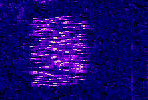 |
||||
| MFSK in middle of tetra band | A bit of a mystery MFSKMultiple Frequency Shift-Keying? signal in middle of tetra band. VERY LOUD | 380.927 MHzMegaHertz (MHz) 10^6 Hz | 5.28 kHzKiloHertz (kHz) 10^3 Hz | 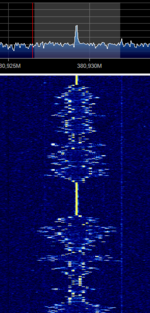 |
||||
| Maritime Public Safety Radio Network P25 | https://drive.google.com/drive/folders/0B1Cfk2C-y-z7d1dsbmlsMlBEWUE?usp=sharing This is a sample of my local Maritime Public Safety Radio Network in the APCO Project 25 mode. The reason I am submitting this is because no matter what I do, DSD+ does not decode it whatsoever. I have tested it on sample P25 signals, and it seems to work fine. | 769.656 MHzMegaHertz (MHz) 10^6 Hz | 12.5 kHzKiloHertz (kHz) 10^3 Hz |  |
||||
| Maybe XF faders | Sounds like XF Faders | 4.5 MHzMegaHertz (MHz) 10^6 Hz | 9 kHzKiloHertz (kHz) 10^3 Hz | — | ||||
| Mistery HF Signal seen on a Web Sdr radio | Very wide Spectrum Signal seen at diverse parts of the HFHigh Frequency (3-30 MHz) Spectrum since a week starting in October 2020 | 4.915 kHzKiloHertz (kHz) 10^3 Hz | 3 kHzKiloHertz (kHz) 10^3 Hz | — |  |
|||
| Mysterious signal in low VHF band | 35 MHzMegaHertz (MHz) 10^6 Hz — 75 MHzMegaHertz (MHz) 10^6 Hz | 20 kHzKiloHertz (kHz) 10^3 Hz |  |
|||||
| Mystery Signal | Unknown kind of maybe digital signal | 468.627 MHzMegaHertz (MHz) 10^6 Hz | 12.5 kHzKiloHertz (kHz) 10^3 Hz | 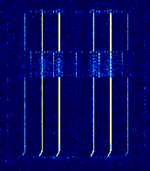 |
||||
| NOAA APT Oddity | I was waiting for a pass from the satellite NOAA 18 when I was a choppy APT signal from what I assumed from NOAA 19, but a picture from WXtrack showed that its radio horizon was over 1,000 miles away from my location (the green cross).l I am not sure if this is some sort of signal propagation or if there was an old NOAA satellite that may have come back to life (I have seen articles from a few sources of how this might be). | 137.1 MHzMegaHertz (MHz) 10^6 Hz | 0 HzHertz (Hz), unit of frequency, defined as one cycle per second (1 Hz). — 45 HzHertz (Hz), unit of frequency, defined as one cycle per second (1 Hz). | — | — | |||
| New possible Russian Digimode | The signal is believed to be a new russian communication mode/modem. I found this signal with my SdrplayRsp2Pro and a 15m (50ft) longwire antenna with 1:9 Unun. The signal was also heard on the Websdr in the Netherlands so it was not local. | 10.225 MHzMegaHertz (MHz) 10^6 Hz — 10.24 MHzMegaHertz (MHz) 10^6 Hz | 15 kHzKiloHertz (kHz) 10^3 Hz | 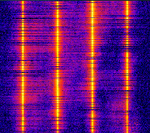 |
||||
| Nknown 472p875 | 472.875 MHzMegaHertz (MHz) 10^6 Hz — 504.675 MHzMegaHertz (MHz) 10^6 Hz | 6 kHzKiloHertz (kHz) 10^3 Hz |  |
|||||
| Noise on 160m | Hi, this noise has recently appeared on top band, 160m and I wondered if anyone has any idea of it's origin. Speculation is that it is over the horizon radar coming from France. Any suggestions would be greatly appreciated since it is destroying a UK net that has been running on 1933 for many years. | 1.933 MHzMegaHertz (MHz) 10^6 Hz | 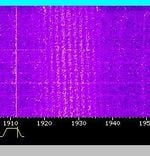 |
|||||
| Noise on HF HAM Bands from 0 to 30 Mhz | 0 HzHertz (Hz), unit of frequency, defined as one cycle per second (1 Hz). |  |
||||||
| Noise over all HF bands | Strange noise that starts middle of a day and ends in the evening. All HFHigh Frequency (3-30 MHz) bands are almost covered ( after 17MHz it starts to fade) clearly are visible harmonics. | |||||||
| Noise-like signal | There are stationary and moving signals I think. Likely police radio. | 148.6 MHzMegaHertz (MHz) 10^6 Hz — 169.775 MHzMegaHertz (MHz) 10^6 Hz | 10 kHzKiloHertz (kHz) 10^3 Hz |  |
||||
| Non lo so | vorrei sapere che segnale è, ci sono momenti in cui gli impulsi cambiano come per completare un messaggio, va avanti per ore credo, e non c'è sempre, in certi giorni c'è credo, e la seconda volta che lo trovo [ I would like to know what signal it is, there are times when the impulses change as if to complete a message, it goes on for hours I think, and it's not always there ] | 163.89 MHzMegaHertz (MHz) 10^6 Hz | 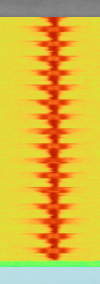 |
|||||
| OTH Radar | 10.730 Mhz Unknown Signal. Signal also appears on 10.570 MHzMegaHertz (MHz) 10^6 Hz. | 10.57 MHzMegaHertz (MHz) 10^6 Hz — 10.73 MHzMegaHertz (MHz) 10^6 Hz | 20 kHzKiloHertz (kHz) 10^3 Hz |  |
||||
| Odd Signal | Was scanning around the 10 meter band with my SDR when I found this AMAmplitude Modulation signal. | 25.175 MHzMegaHertz (MHz) 10^6 Hz |  |
|||||
| Odd signal | not sure if it could be analog or not but i haven't seen anything like it. | 6.58 MHzMegaHertz (MHz) 10^6 Hz | 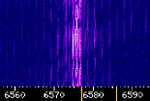 |
|||||
| Oktan-28 | 5.13 MHzMegaHertz (MHz) 10^6 Hz | — | ||||||
| One of many signals near 877 MHz | Probably 3G or 4G cellular signals | 877.875 MHzMegaHertz (MHz) 10^6 Hz | 2.55 MHzMegaHertz (MHz) 10^6 Hz | — |  |
|||
| One with squelch | Left signal keeps period pretty well. Haven't noticed any changes yet. It's not always active, but I can see it most of the day. IQQuadrature signals form the basis of complex RF signal modulation and demodulation, both in hardware and in software, as well as in complex signal analysis. available | 137.5 MHzMegaHertz (MHz) 10^6 Hz | 60 kHzKiloHertz (kHz) 10^3 Hz | 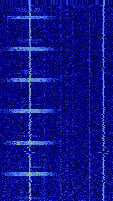 |
||||
| Over the Horizon Radar | 14.541 MHzMegaHertz (MHz) 10^6 Hz | 30 kHzKiloHertz (kHz) 10^3 Hz | 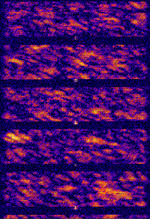 |
|||||
| P2000/C2000? | 169.65 | 169.65 MHzMegaHertz (MHz) 10^6 Hz | — |  |
||||
| POCSAG (Paging)? | Heard and still active, found in Nelspruit, Mpumalanga, South Africa. From the Research, I believe this is a paging system that belongs to NetStar. | 170.9 MHzMegaHertz (MHz) 10^6 Hz | 12.5 kHzKiloHertz (kHz) 10^3 Hz | 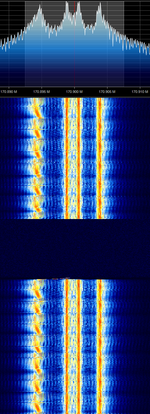 |
||||
| Police helicopter emission | Unknown transmission that originates from Victoria Police Airwing helicopters. | 398 MHzMegaHertz (MHz) 10^6 Hz | 20 kHzKiloHertz (kHz) 10^3 Hz | 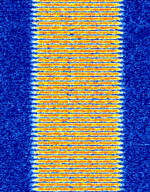 |
||||
| Possible Russian Marker 'Airhorn' 4020kHz | Unknown signal that was recently discovered a few days ago on the uTwente webSDR. Features a suppressed lower sideband. Strong reception in Poland's webSDR. | 4.02 MHzMegaHertz (MHz) 10^6 Hz | 2.8 kHzKiloHertz (kHz) 10^3 Hz | 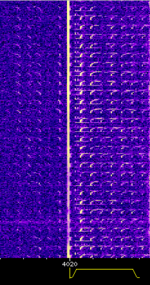 |
||||
| Possible Telemetry GFSK signal on 220Mhz | Possible train telemetry signal on 220.365Mhz. Pulsed GFSKGaussian Frequency-Shift Keying signal. Runs 24x7 | 220.365 MHzMegaHertz (MHz) 10^6 Hz | 4 kHzKiloHertz (kHz) 10^3 Hz |  |
||||
| Possible digisonde or other sounder 8p4 | Some kind of a sounder that steps through frequencies. Resembles digisonde but has some differences. | 8 MHzMegaHertz (MHz) 10^6 Hz — 9 MHzMegaHertz (MHz) 10^6 Hz | 55 kHzKiloHertz (kHz) 10^3 Hz | 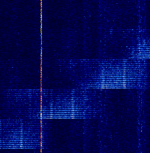 |
||||
| Possible low level wind shear alert system | Frequency matches known wind shear alert system frequencies used in aeronautics. Captured near an airport, so this is likely, but have no way to confirm. | 409.572 MHzMegaHertz (MHz) 10^6 Hz | 250 HzHertz (Hz), unit of frequency, defined as one cycle per second (1 Hz). | 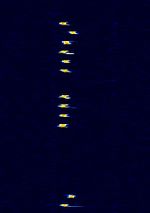 |
||||
| Possible weather station sensor on air band | Three strong signals at 120MHz, in the air band. Source of signal is unknown. Polarisation seems to be circular, as both vertical and horizontal dipoles can receive it at similar strengths. | 120 MHzMegaHertz (MHz) 10^6 Hz | 4 kHzKiloHertz (kHz) 10^3 Hz — 14 kHzKiloHertz (kHz) 10^3 Hz | 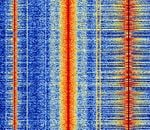 |
||||
| Possibly a RADAR | https://www.reddit.com/r/RTLSDR/comments/aa2hi6/found_at_3603018_mhz_in_massachusetts_any_idea/ | 360.3 MHzMegaHertz (MHz) 10^6 Hz | 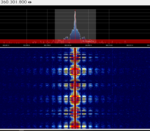 |
|||||
| Potential Radar | Unknown signal, about 1.7 seconds in length, with an interval of around 6 to 8 seconds. Recorded via Twente SDR. An identical signal also appears around 4023-4040 Khz. | 3.313 MHzMegaHertz (MHz) 10^6 Hz — 3.331 MHzMegaHertz (MHz) 10^6 Hz | 18 kHzKiloHertz (kHz) 10^3 Hz | 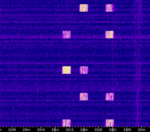 |
||||
| Pulsar on 33.0005 GHz | Hi i found this signal on 33GHz Freq., signal is pulsation from unknow source | 5 HzHertz (Hz), unit of frequency, defined as one cycle per second (1 Hz). — 33 HzHertz (Hz), unit of frequency, defined as one cycle per second (1 Hz). | 200 kHzKiloHertz (kHz) 10^3 Hz |  |
||||
| Pulsing Digital Signal | Pulsing signal I found. Transmits intermittently with varying amount of pulses. | 410.85 MHzMegaHertz (MHz) 10^6 Hz — 474.975 MHzMegaHertz (MHz) 10^6 Hz | 12.5 kHzKiloHertz (kHz) 10^3 Hz | 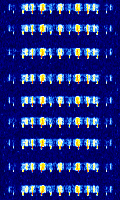 |
||||
| Pulsing interference in ISM band | This pulsing is constant 24/7 dont know which type of interference it is, and it also seems to spread out like a mobile network when moving to the right of the main peak. | 912.925 MHzMegaHertz (MHz) 10^6 Hz | 32 kHzKiloHertz (kHz) 10^3 Hz |  |
||||
| RF signal modulate at low frequency | Signal IQQuadrature signals form the basis of complex RF signal modulation and demodulation, both in hardware and in software, as well as in complex signal analysis. file can be downloaded from Microsoft file server :
Download files at : https://1drv.ms/u/s!AvlNmSqrGlNVgTF6qyGs9d8h3fBS Note : File is +/- 2 GB Waterfall image : https://1drv.ms/i/s!AvlNmSqrGlNVgWivmYjg2UxL-zM1 |
0 HzHertz (Hz), unit of frequency, defined as one cycle per second (1 Hz). | — | |||||
| Radar-like signal | A burst signal like VDL | 9.805 MHzMegaHertz (MHz) 10^6 Hz — 12.3 MHzMegaHertz (MHz) 10^6 Hz | 5.6 kHzKiloHertz (kHz) 10^3 Hz |  |
||||
| Radar? | I heard this signal on WebSDR. It seems to me that it might be a radar. On the spectrum it changes periodically: at first there is a signal with shifting tone, and then it looks like the mode switches (when it starts buzzing), and all signals on the spectrum disappear except it at 50.315 MHzMegaHertz (MHz) 10^6 Hz. It feels like it is jamming all the other signals. I’m not sure what it could be. | 50.315 MHzMegaHertz (MHz) 10^6 Hz | 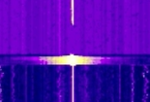 |
|||||
| Radiomodem 423 875 | Electric utility radiomodem network. Probably Satel radiomodem. | 423.875 MHzMegaHertz (MHz) 10^6 Hz | 25 kHzKiloHertz (kHz) 10^3 Hz | 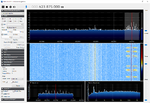 |
||||
| Repeated Signal | A repeated GMSKGaussian Minimum-Shift Keying signal found at 409.905MHz. Short burst repeats about every 2 minutes. Probably from a satellite in geosynchronous orbit. USA, Texas | 409.905 MHzMegaHertz (MHz) 10^6 Hz | 8 kHzKiloHertz (kHz) 10^3 Hz | 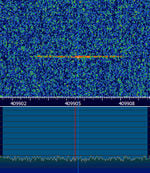 |
||||
| Repeated Tone 457p68 | A repeated tone found at 457.68MHz - Cambridge, England, UK. | 457.68 MHzMegaHertz (MHz) 10^6 Hz | 13 kHzKiloHertz (kHz) 10^3 Hz | 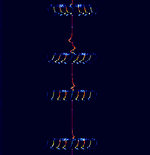 |
||||
| Repeated across HF | Strong CWContinuous Wave signal at approximately 3.064 kHzKiloHertz (kHz) 10^3 Hz, changes to 3.079 kHzKiloHertz (kHz) 10^3 Hz once per second for about a quarter of a second and then back. Possibly very fast sweep. Echos of it across the lower HFHigh Frequency (3-30 MHz) spectrum. Pauses on the high side periodically then resumes. Usually active during daylight hours, but not at night. | 3.064 kHzKiloHertz (kHz) 10^3 Hz | 15 kHzKiloHertz (kHz) 10^3 Hz | 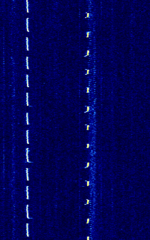 |
||||
| Repeating signal 404MHz | Many peaks from 403 to 405 MHzMegaHertz (MHz) 10^6 Hz, duration 1-2 seconds. Repeating. | 403 MHzMegaHertz (MHz) 10^6 Hz — 405 MHzMegaHertz (MHz) 10^6 Hz | — |  |
||||
| SITOR-A Unknown data | When I was receiving the SITOR-A signal,A 2khz signal similar to QPSKQuadrature Phase-Shift Keying (2 bits per symbol) modulation suddenly appeared. | 4.158 MHzMegaHertz (MHz) 10^6 Hz | 2 kHzKiloHertz (kHz) 10^3 Hz | 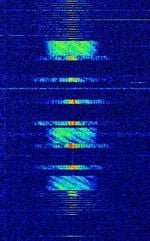 |
||||
| Same signal from unknow source | 434 MHzMegaHertz (MHz) 10^6 Hz | 300 kHzKiloHertz (kHz) 10^3 Hz | — |  |
||||
| Short PSK or AFSK pulses at 461.025 | Either an extremely fast PSKPhase-Shift Keying or FSKFrequency-Shift Keying/AFSKAudio Frequency-Shift Keying link located in the UHFUltra High Frequency (300-3000 MHz) band appearing every second. Found today. | 461.025 MHzMegaHertz (MHz) 10^6 Hz | 9.2 kHzKiloHertz (kHz) 10^3 Hz |  |
||||
| Signal inconnue | 444.525 MHzMegaHertz (MHz) 10^6 Hz |  |
||||||
| Signal that is moving down | Weird signal that moves slower the lower it gets down the band. If the mode is set to NFMNarrowband Frequency Modulation, WFMWideband Frequency Modulation, AMAmplitude Modulation and probaly some more it doesn't give any sound. However in CWContinuous Wave and RAW it sounds like a high pitched noise. | 630 MHzMegaHertz (MHz) 10^6 Hz — 700 MHzMegaHertz (MHz) 10^6 Hz | 1 kHzKiloHertz (kHz) 10^3 Hz | — |  |
|||
| Single Tone | It keeps broadcasting nonstop (from the time I started listening). Doesn't seem to have a purpose, but what is making it? Used SDR# - Tuned in at 172.7551 MHzMegaHertz (MHz) 10^6 Hz - Recorded using CWContinuous Wave | 172.755 MHzMegaHertz (MHz) 10^6 Hz | 400 HzHertz (Hz), unit of frequency, defined as one cycle per second (1 Hz). | 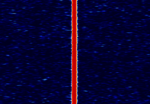 |
||||
| Sliding tone | Lasted from 15:45 UTC to 15:50 UTC Inconsistent beeping, with pitch constantly sliding and changing, like a slide whistle | 5.25 MHzMegaHertz (MHz) 10^6 Hz | 2.4 kHzKiloHertz (kHz) 10^3 Hz | — | — | |||
| Some kind of MOBITEX | I just found this signal with my RSP2. I have no idea what it is? Maybe Mobitex? | 869.4 MHzMegaHertz (MHz) 10^6 Hz — 869.55 MHzMegaHertz (MHz) 10^6 Hz | 150 kHzKiloHertz (kHz) 10^3 Hz | 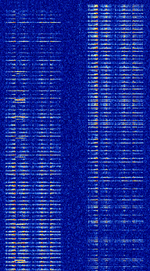 |
||||
| Squiggling oddity | maybe a broken beacon or something? idk |  |
||||||
| Strange Musical Repeating Tone - 945.716 MHz | Found when noticing harmonics in ~400 MHzMegaHertz (MHz) 10^6 Hz, comes out strongest @ 945.716 MHzMegaHertz (MHz) 10^6 Hz | 945.716 MHzMegaHertz (MHz) 10^6 Hz | 32 kHzKiloHertz (kHz) 10^3 Hz |  |
||||
| Strange Signal | I found out that it was my old thermostat for my central heating. As soon as i pressed a button the signal changed. Replaced it with a new one. Now it is gone. | 27 MHzMegaHertz (MHz) 10^6 Hz — 446 MHzMegaHertz (MHz) 10^6 Hz | 5 kHzKiloHertz (kHz) 10^3 Hz |  |
||||
| Strange beeps at 1.2ghz | strange beeps @ the 1.200018 range (my rtl-sdr isn't calibrated right, so there may be frequency drift on my end) | 1,200.019 MHzMegaHertz (MHz) 10^6 Hz | 4.5 kHzKiloHertz (kHz) 10^3 Hz | 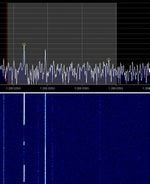 |
||||
| Strange signal at 9045 kHz | A strange signal at 9045 KHzKiloHertz (kHz) 10^3 Hz | 9.045 MHzMegaHertz (MHz) 10^6 Hz | 1.2 MHzMegaHertz (MHz) 10^6 Hz |  |
||||
| Strange signal starst at 13388-13640 khz | 0 HzHertz (Hz), unit of frequency, defined as one cycle per second (1 Hz). | 250 kHzKiloHertz (kHz) 10^3 Hz | — | 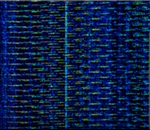 |
||||
| Strange unknown signal on 423.550 mhz | Hi, i don't know what it is, on 423.375 and 423.550 mhz very strange and strong unknown signal | 0 HzHertz (Hz), unit of frequency, defined as one cycle per second (1 Hz). | 10 kHzKiloHertz (kHz) 10^3 Hz | — |  |
|||
| Strong HF signal | 7.735 kHzKiloHertz (kHz) 10^3 Hz — 16.11 kHzKiloHertz (kHz) 10^3 Hz | 100 kHzKiloHertz (kHz) 10^3 Hz | — | 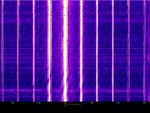 |
||||
| Strong UNID Horn-like signal | Incredibly strong horn-like signal. | 0 HzHertz (Hz), unit of frequency, defined as one cycle per second (1 Hz). | 250 kHzKiloHertz (kHz) 10^3 Hz | 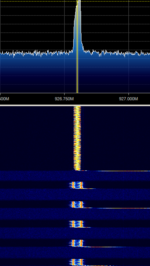 |
||||
| UNID 8862kHz LSB | Sounds vaguely like a voice scrambler mixed with a duck quacking | 8.862 MHzMegaHertz (MHz) 10^6 Hz | 3 kHzKiloHertz (kHz) 10^3 Hz | 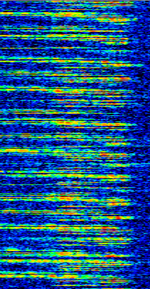 |
||||
| UNID Datamode | Unknown datamode. Initially thought to be a 4+4 variant, signal gets weaker on farther east SDRs. Recorded from UTwente WebSDR at 15:47z Dec. 4th. | 8.071 MHzMegaHertz (MHz) 10^6 Hz | 2.4 kHzKiloHertz (kHz) 10^3 Hz | 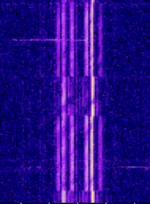 |
||||
| UNID Telemetry | This is a frequency I picked up in my home town, I believe it is telemetry from a water tower, but would like to know what standard it is using and if there's any way I can find a program that will decode its information. | 461 HzHertz (Hz), unit of frequency, defined as one cycle per second (1 Hz). | 10 MHzMegaHertz (MHz) 10^6 Hz | 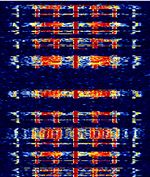 |
||||
| UNID Telemetry, pulsing | Identified: APRSAutomatic Packet Reporting System, an amateur radio-based system for real time tactical digital communications of information of immediate value in the local area signal with position, probably some balloon I couldn't get an IQQuadrature signals form the basis of complex RF signal modulation and demodulation, both in hardware and in software, as well as in complex signal analysis. sample in time because the signal started fading out. Hopefully this is not a problem. | 443.287 MHzMegaHertz (MHz) 10^6 Hz |  |
|||||
| UNID UHF MilSat/RFI Whooping Signal | Weak, dirty NFMNarrowband Frequency Modulation transmitter being rebroadcast through UHFUltra High Frequency (300-3000 MHz) milsat. Whooping is a result of a keyed transmitter with no one speaking. | 269.642 MHzMegaHertz (MHz) 10^6 Hz — 269.644 MHzMegaHertz (MHz) 10^6 Hz | 2.5 kHzKiloHertz (kHz) 10^3 Hz | 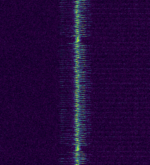 |
||||
| UNID microwave sounding signal 12 MHz | well, it sounds like someone left their chicken nuggets in the microwave on FMFrequency Modulation, completely UNID to me idk what it is, seems to be a real signal and not RFIa specific subset of electrical noise on the Electromagnetic interference (EMI) spectrum. | 12.022 MHzMegaHertz (MHz) 10^6 Hz — 12.025 MHzMegaHertz (MHz) 10^6 Hz | 10 kHzKiloHertz (kHz) 10^3 Hz |  |
||||
| UNID telemetry/paging bursts | Unknown telemetry or paging bursts. Sounds similar to this UNID signal: Unknown 40 3 | 446.45 MHzMegaHertz (MHz) 10^6 Hz | 10 HzHertz (Hz), unit of frequency, defined as one cycle per second (1 Hz). | 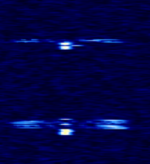 |
||||
| UNKNOWN 10p140 | Html5mediator: file extension not recognized | — | ||||||
| UNKNOWN 9.170 MHZ | Signal seem to have three different modulation schemes, or there was multiple emitters. | 9.176 MHzMegaHertz (MHz) 10^6 Hz — 9.236 MHzMegaHertz (MHz) 10^6 Hz | 9 kHzKiloHertz (kHz) 10^3 Hz | — | ||||
| UNidentified OTH radar on 24 and 25MHz | Unidentified OTHOver The Horizon (very long range) radar. May be Chinese. Or a variant of Container radar. | 24.412 MHzMegaHertz (MHz) 10^6 Hz — 25.146 MHzMegaHertz (MHz) 10^6 Hz | 11 kHzKiloHertz (kHz) 10^3 Hz | 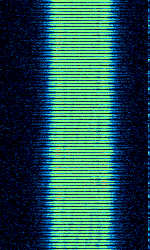 |
||||
| UnIdEastEurope | Herd on 4181.0 Mhz via KDSR. One second tones like time sig but no voice or Morse code. Monitored at 2335 - 0020 UTC | 4,181.8 MHzMegaHertz (MHz) 10^6 Hz | 4 kHzKiloHertz (kHz) 10^3 Hz |  |
||||
| Unid 4-FSK | Really long transmission. Started of with many minutes of 4 pilot tones | 6.979 MHzMegaHertz (MHz) 10^6 Hz | 1.9 kHzKiloHertz (kHz) 10^3 Hz | 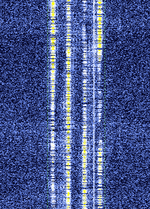 |
||||
| Unid ISM 900MHz | Many frequency hopping ISM bursts. Telemetry of sorts. IQQuadrature signals form the basis of complex RF signal modulation and demodulation, both in hardware and in software, as well as in complex signal analysis. file available | 903 MHzMegaHertz (MHz) 10^6 Hz — 914 MHzMegaHertz (MHz) 10^6 Hz | — | 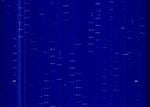 |
||||
| Unid Low VHF | It is going 24/7, sometimes one stations, sometimes two. I believe it is something from the military. Location Kempele, Finland. | 40.665 MHzMegaHertz (MHz) 10^6 Hz | 2.4 kHzKiloHertz (kHz) 10^3 Hz | 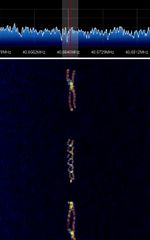 |
||||
| Unid analogue signal - ecg like | 0 HzHertz (Hz), unit of frequency, defined as one cycle per second (1 Hz). | 50 kHzKiloHertz (kHz) 10^3 Hz | — | 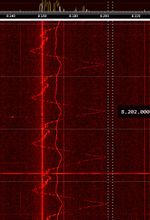 |
||||
| Unidentified 'buzzer' or possibly jammer | Unknown "buzzer" signal. Suspected as a channel marker, possibly a Russian military jamming system. | 3 MHzMegaHertz (MHz) 10^6 Hz — 30 MHzMegaHertz (MHz) 10^6 Hz | 2 kHzKiloHertz (kHz) 10^3 Hz — 20 kHzKiloHertz (kHz) 10^3 Hz | 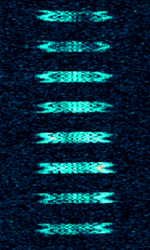 |
||||
| Unidentified 433Mhz Oscillating Signal | Band Reserved to ISM and LPD applications, unknown type of signal. | 0 HzHertz (Hz), unit of frequency, defined as one cycle per second (1 Hz). | 2 kHzKiloHertz (kHz) 10^3 Hz | — |  |
|||
| Unidentified 460p214 | Unidentified signal, 24/7 carrier, transmits mfsk-8? every 15 minutes. transmitter appears broken. | 460.214 MHzMegaHertz (MHz) 10^6 Hz | 14 kHzKiloHertz (kHz) 10^3 Hz | 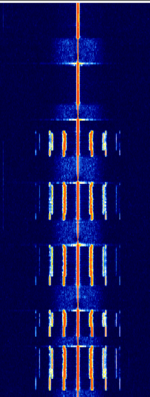 |
||||
| Unidentified 466 MHz digital signal | This signal changes frequencies every few seconds inside a range between 460-470 MHzMegaHertz (MHz) 10^6 Hz. | 0 HzHertz (Hz), unit of frequency, defined as one cycle per second (1 Hz). | — |  |
||||
| Unidentified 5066p3kHz signal | New to this stuff so not sure if it's an identifiable signal but does not seem to be a data transmission, appears to have been going on for at least a few hours at time of submitting. Your signal found is actually Link-11 apparently without a tone. <AT90S2323> | 5.066 MHzMegaHertz (MHz) 10^6 Hz |  |
|||||
| Unidentified 959.85MHz | Mystery signal captured in Tulsa, Oklahoma. Signal has strong carrier at 959.85MHz with short pulses in about 4.5KHz each direction. | 959.856 MHzMegaHertz (MHz) 10^6 Hz | 9 kHzKiloHertz (kHz) 10^3 Hz | 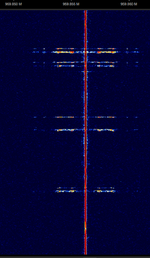 |
||||
| Unidentified Bus Timetable Data | Hi there, our local bus company in Aberdeen transmits timetable information to bus stops using this mode... but I can't identify what type of transmission it is. Hope someone can help! Received on 204.9625 MHzMegaHertz (MHz) 10^6 Hz in Aberdeen, Scotland. | 204.963 MHzMegaHertz (MHz) 10^6 Hz | 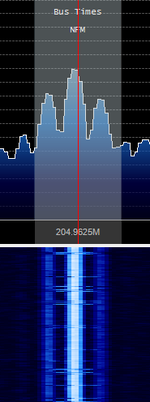 |
|||||
| Unidentified DMR Signal | 464.615 kHzKiloHertz (kHz) 10^3 Hz — 464.66 kHzKiloHertz (kHz) 10^3 Hz | 21.17 kHzKiloHertz (kHz) 10^3 Hz | — | 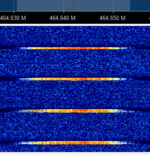 |
||||
| Unidentified Digital mode | Tetra sounding signal that i cant figure out | 782.15 MHzMegaHertz (MHz) 10^6 Hz — 782.7 MHzMegaHertz (MHz) 10^6 Hz | 50 kHzKiloHertz (kHz) 10^3 Hz | — |  |
|||
| Unidentified FSK Signal | Unidentified FSKFrequency-Shift Keying signal at 450.994MHz | 450.994 MHzMegaHertz (MHz) 10^6 Hz | 8 kHzKiloHertz (kHz) 10^3 Hz | 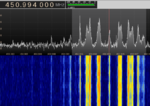 |
||||
| Unidentified Jammer 1 | A suspected jammer found on multiple frequencies on the 31m band. The jammer appears over religious broadcasts, specifically Christian (i.e. Vatican radio, Adventist Radio, etc). | 9.696 MHzMegaHertz (MHz) 10^6 Hz | 30 kHzKiloHertz (kHz) 10^3 Hz |  |
||||
| Unidentified MFSK on 7739 (7740) kHz | Unknown MFSKMultiple Frequency Shift-Keying signal that was transmitted in short bursts. | 7.739 MHzMegaHertz (MHz) 10^6 Hz | 3 kHzKiloHertz (kHz) 10^3 Hz | 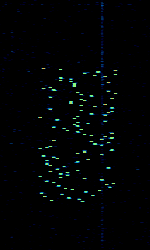 |
||||
| Unidentified Radar (or QRM) on 20840 | Possible OTHOver The Horizon (very long range) radar, pulsed signal without any other characteristics. Could be QRM too. | 20.84 MHzMegaHertz (MHz) 10^6 Hz | 10 kHzKiloHertz (kHz) 10^3 Hz | 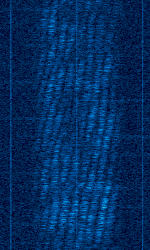 |
||||
| Unidentified Radar or other oddity | Odd signal with unusual structure, possibly a radar or a jammer. | 12.294 MHzMegaHertz (MHz) 10^6 Hz — 12.488 MHzMegaHertz (MHz) 10^6 Hz | 10 kHzKiloHertz (kHz) 10^3 Hz | 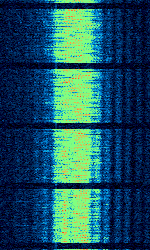 |
||||
| Unidentified Signal | Observed on Saturday March 1, 2025 at 21:00 hours near Taylor, TXTransmit (Austin). There is a county airport nearby, and also larger domestic flights are over this location all the time. | 45 MHzMegaHertz (MHz) 10^6 Hz | 15 kHzKiloHertz (kHz) 10^3 Hz | — | 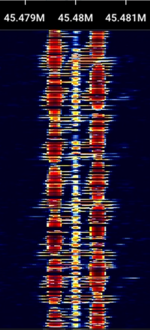 |
|||
| Unidentified Signal 1 | An unidentified signal with an unusual waterfall | 16.375 MHzMegaHertz (MHz) 10^6 Hz | 20 kHzKiloHertz (kHz) 10^3 Hz | 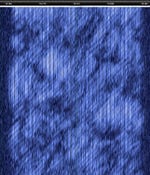 |
||||
| Unidentified Signal 2 | Unidentified signal, appears to mimic a switched mode power supply but is very high in the VHFVery High Frequency (30-300 MHz) band and much wider. | 263.141 MHzMegaHertz (MHz) 10^6 Hz | 100 kHzKiloHertz (kHz) 10^3 Hz | 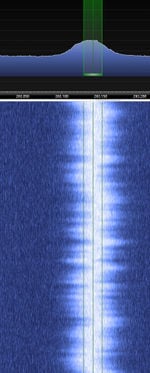 |
||||
| Unidentified Signal 3 | An unidentified radar or data mode | 4.563 MHzMegaHertz (MHz) 10^6 Hz | 5.2 kHzKiloHertz (kHz) 10^3 Hz | 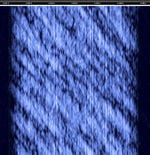 |
||||
| Unidentified Signal 5 | An unidentified signal that can appear from 1MHz-30MHz, sometimes as high as even 70MHz. The signal has variable bandwidth and can spread for more than 10MHz. The signal sounds like a radar/jammer. | 5.9 MHzMegaHertz (MHz) 10^6 Hz | 500 kHzKiloHertz (kHz) 10^3 Hz |  |
||||
| Unidentified Signal 6 | An unidentified signal which broadcasts for 26 seconds with a few seconds of a gap. | 2.128 MHzMegaHertz (MHz) 10^6 Hz | 800 kHzKiloHertz (kHz) 10^3 Hz |  |
||||
| Unidentified Signal at 2.4 GHz | The signal works at 2.4 GHzGigaHertz (GHz) 10^9 Hz and the affected most of channels at 2.4 GHzGigaHertz (GHz) 10^9 Hz.There is always increase of SNR at various channels for Wi-FI signals. This Signal is modulated at low frequencies ( 30-100 HzHertz (Hz), unit of frequency, defined as one cycle per second (1 Hz). ). | 0 HzHertz (Hz), unit of frequency, defined as one cycle per second (1 Hz). |  |
|||||
| Unidentified Signal on UHF | Unidentified Signal on UHFUltra High Frequency (300-3000 MHz) Frequency | 448.5 MHzMegaHertz (MHz) 10^6 Hz — 448.58 MHzMegaHertz (MHz) 10^6 Hz | 448.5 MHzMegaHertz (MHz) 10^6 Hz — 448.58 MHzMegaHertz (MHz) 10^6 Hz | 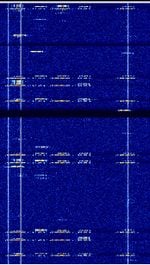 |
||||
| Unidentified Thing | Submitted on behalf of Aaronata. Not sure what this was supposed to be. |  |
||||||
| Unidentified digital burst signal around 31.475 MHz (possible military/industrial data link) | Unidentified wideband digital signal captured around 31.475 MHzMegaHertz (MHz) 10^6 Hz.
The signal consists of short periodic bursts separated by silence, each showing a rectangular multi-tone structure on the waterfall. Likely some kind of professional or military data modem, not matching common AFSKAudio Frequency-Shift Keying, PSKPhase-Shift Keying or MFSKMultiple Frequency Shift-Keying profiles. |
31.475 MHzMegaHertz (MHz) 10^6 Hz | 6.25 kHzKiloHertz (kHz) 10^3 Hz | 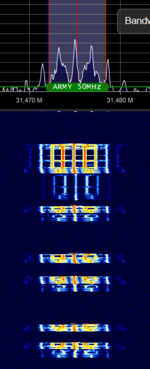 |
||||
| Unidentified digital signal on HF | digital noise | 0 HzHertz (Hz), unit of frequency, defined as one cycle per second (1 Hz). | Html5mediator: file extension not recognized | |||||
| Unidentified oddity and meteor radar on 31 MHz | A meteor radar (likely part of Nordic Meteor Radar cluster, quite likely SKiYMET type) and an oddity on 31 MHzMegaHertz (MHz) 10^6 Hz. | 31 MHzMegaHertz (MHz) 10^6 Hz | 2 kHzKiloHertz (kHz) 10^3 Hz — 70 kHzKiloHertz (kHz) 10^3 Hz | 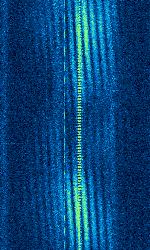 |
||||
| Unidentified radar on 30p8 and 42p8 | Unidentified VHFVery High Frequency (30-300 MHz) low band radar on two frequencies. | 30.8 MHzMegaHertz (MHz) 10^6 Hz — 42.8 MHzMegaHertz (MHz) 10^6 Hz | 50 kHzKiloHertz (kHz) 10^3 Hz | 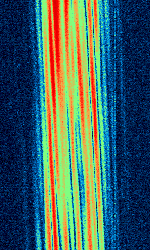 |
||||
| Unidentified signal | Observed on Saturday March 1, 2025 at 21:00 hours near Taylor, TXTransmit (Austin). There is a county airport nearby, and also larger domestic flights are over this location all the time. | 44.008 MHzMegaHertz (MHz) 10^6 Hz — 44.015 MHzMegaHertz (MHz) 10^6 Hz | 7.5 kHzKiloHertz (kHz) 10^3 Hz | — | 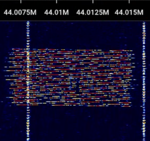 |
|||
| Unidentified signal (APRS-like) | This singnal is on air 24/7. Judging by existing records of frequency allocation, this belongs to a water company. Modulation unknown, so cannot decode and confirm. | 149.1 MHzMegaHertz (MHz) 10^6 Hz | 5.7 kHzKiloHertz (kHz) 10^3 Hz | 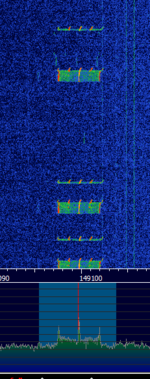 |
||||
| Unidentified signal at 161.252 kHz | Signal at 161.252.000 HzHertz (Hz), unit of frequency, defined as one cycle per second (1 Hz). on 12 kHzKiloHertz (kHz) 10^3 Hz NFMNarrowband Frequency Modulation bandwidth. I think it's some sort of vessel communication system, because I live near the coast of Burgas, Bulgaria. I am not familiar with the decoding of this digital signal. | 161.252 kHzKiloHertz (kHz) 10^3 Hz | 12 kHzKiloHertz (kHz) 10^3 Hz | 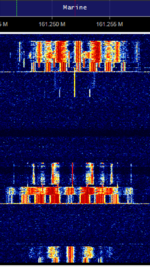 |
||||
| Unidentified signal captured overlapping ch 16 marine emergency freq. | It looks like some kind of frequency hopping system, as the actual bandwidth is of about 50 kHzKiloHertz (kHz) 10^3 Hz but the central frequency is rapidly changing during transmission to cover about a total of 200 kHzKiloHertz (kHz) 10^3 Hz. | 156.805 MHzMegaHertz (MHz) 10^6 Hz | 200 kHzKiloHertz (kHz) 10^3 Hz | — |  |
|||
| Unidientified (MFSK-13) | Unidentified 13 tone MFSKMultiple Frequency Shift-Keying signal, measures about 32 milliseconds per tone, looks like serdolik with less tones and slower. Possible russian diplomatic signal | 4.871 MHzMegaHertz (MHz) 10^6 Hz | 3.2 kHzKiloHertz (kHz) 10^3 Hz |  |
||||
| Unindentified 438p838 | Should be related to radiolocation services according to Croatia's signal allocations. | 438.838 MHzMegaHertz (MHz) 10^6 Hz | 7 kHzKiloHertz (kHz) 10^3 Hz | 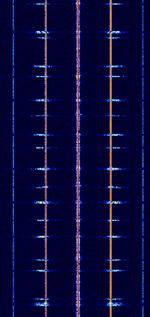 |
||||
| Unk Russian Intel 1 | Sample from RadioScanner, supposed to be a variant of russian intel digimode testing, unsure of name/variant. | 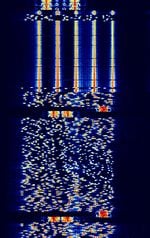 |
||||||
| Unk Russian Intel 2 | Sample from RadioScanner.RU, supposed to be a variant of russian intel digimode testing, unsure of name/variant. PSKPhase-Shift Keying variant | 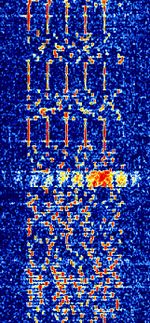 |
||||||
| Unk Russian Intel 3 | Sample from RadioScanner, supposed to be a variant of russian intel digimode testing, unsure of name/variant. Possibly poor recording quality, unique preamble intro. Considerable high frequency losses in recording. | 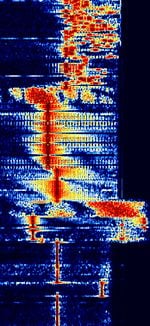 |
||||||
| Unk Russian Intel or Military lakisan | Sample from RadioScanner, supposed to be a variant of russian intel or military digimode, unsure of name/variant. lakisan not sure | 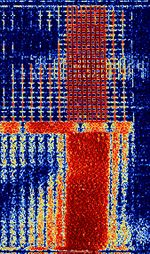 |
||||||
| Unk Russian Intel or Military ofdm | Sample from RadioScanner, supposed to be a variant of russian intel digimode, unsure of name/variant. Recorded by Karapuz supposedly. | 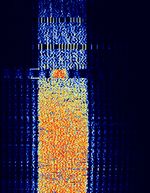 |
||||||
| Unk Russian Intel or Military СТРYНА OFDM | Sample from RadioScanner, supposed to be a variant of russian intel or military digimode testing, unsure of name/variant. Possibly recorded by KarapuZ, not sure where I got from. | 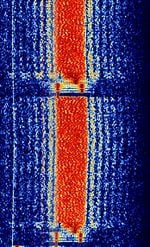 |
||||||
| Unknow 400MHz | remote sensor of home weather station? | 400 MHzMegaHertz (MHz) 10^6 Hz | — |  |
||||
| Unknow Signal | 3.831 MHzMegaHertz (MHz) 10^6 Hz | 5 kHzKiloHertz (kHz) 10^3 Hz | 150px | |||||
| Unknow signal lewis county Washington state | recording on a PDA off of a unshelded Mic line. also heard on the AMAmplitude Modulation radio band at random times. I have heard it on my car radio at 1000khz, 1420khz, 530khz and intercoms , PA systems over 33 miles apart. | 1 MHzMegaHertz (MHz) 10^6 Hz | — | |||||
| Unknown "whistle" signal on 49m broadcast band | Unknown whistling signal at 6065 khz | 6.065 MHzMegaHertz (MHz) 10^6 Hz | 10 kHzKiloHertz (kHz) 10^3 Hz | 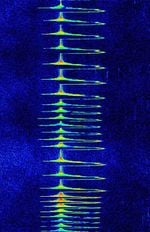 |
||||
| Unknown (V.29 fax machine) modem | This signal is used for the latter or if no message is being broadcasted. (Like Glenayre paging link, including other purposes.) | 406 MHzMegaHertz (MHz) 10^6 Hz — 455 MHzMegaHertz (MHz) 10^6 Hz | 8 kHzKiloHertz (kHz) 10^3 Hz | 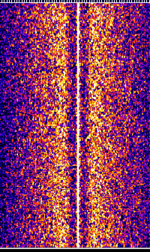 |
||||
| Unknown 03p100 | Observed on Sunday February 23, 2025 at 21:00 hours near Taylor, TXTransmit (Austin). There is a county airport nearby, and also larger domestic flights are over this location all the time. | 3.1 MHzMegaHertz (MHz) 10^6 Hz | 80 kHzKiloHertz (kHz) 10^3 Hz | — | 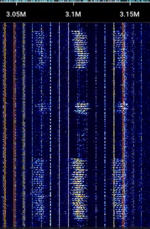 |
|||
| Unknown 07.077 MHz | Heard at the lower end of 40m, digital band. Tried to match with existing signals at this Wiki but none found. | 7.077 MHzMegaHertz (MHz) 10^6 Hz | 2 kHzKiloHertz (kHz) 10^3 Hz | 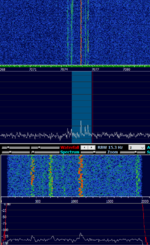 |
||||
| Unknown 1 | on going never ending, do not know what it is. | 455 HzHertz (Hz), unit of frequency, defined as one cycle per second (1 Hz). — 124 MHzMegaHertz (MHz) 10^6 Hz | 9 kHzKiloHertz (kHz) 10^3 Hz | 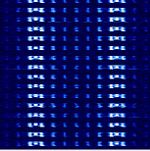 |
||||
| Unknown 10p6 weak radar 48kHz wide | Weak radar signal, about 48 kHzKiloHertz (kHz) 10^3 Hz wide, probably pulsed but could be FMCW. | 10.6 MHzMegaHertz (MHz) 10^6 Hz | 48 kHzKiloHertz (kHz) 10^3 Hz | 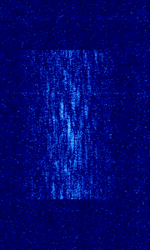 |
||||
| Unknown 11p935 suspected broadcast jammer or idling data mode | Suspected broadcast jammer, idling data mode or radar (unlikely) | 11.82 MHzMegaHertz (MHz) 10^6 Hz — 11.935 MHzMegaHertz (MHz) 10^6 Hz | 10 kHzKiloHertz (kHz) 10^3 Hz | 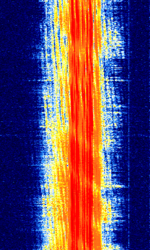 |
||||
| Unknown 12p164 HF data mode | Unknown HFHigh Frequency (3-30 MHz) data burst mode. | 12.164 MHzMegaHertz (MHz) 10^6 Hz | 3.1 kHzKiloHertz (kHz) 10^3 Hz | 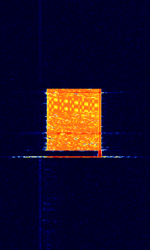 |
||||
| Unknown 12p6 pulsed radar-like signal 180kHz wide with starting pattern | Pulsed radar-like signal, 180 kHzKiloHertz (kHz) 10^3 Hz wide. Pulsates at a rate of 25 HzHertz (Hz), unit of frequency, defined as one cycle per second (1 Hz).. Occasionally stops and restarts with a starting pattern. | 12.6 MHzMegaHertz (MHz) 10^6 Hz — 21.4 MHzMegaHertz (MHz) 10^6 Hz | 180 kHzKiloHertz (kHz) 10^3 Hz | 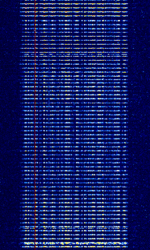 |
||||
| Unknown 139p024 | Intermittent transmission in the 139.024MHz frequency. It also appeared near 137.915MHz and messed up my download from a NOAA satellite. It seems to be digital maybe? Most similar signal that I found was ACARS but this is not the correct frequency. | 139.024 MHzMegaHertz (MHz) 10^6 Hz | 16 kHzKiloHertz (kHz) 10^3 Hz | 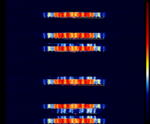 |
||||
| Unknown 139p650 | Central Texas receiving location | 139.65 MHzMegaHertz (MHz) 10^6 Hz | 12.5 kHzKiloHertz (kHz) 10^3 Hz | 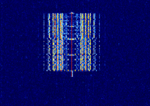 |
||||
| Unknown 13p361 MFSK-17 signal | Unknown MFSKMultiple Frequency Shift-Keying-17 signal with wide bandwidth | 13.361 MHzMegaHertz (MHz) 10^6 Hz | 37.5 kHzKiloHertz (kHz) 10^3 Hz | 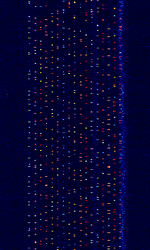 |
||||
| Unknown 13p500 signal with rhythmic beeps in random intervals | I think this could just be interference but the rhythmic beeps make me think it isn't. The sound closely resembles a clown horn. | 0 HzHertz (Hz), unit of frequency, defined as one cycle per second (1 Hz). | 0 HzHertz (Hz), unit of frequency, defined as one cycle per second (1 Hz). | 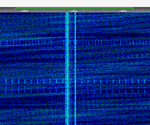 |
||||
| Unknown 13p500 signal with rhythmic beeps in random intervals | I think this could just be interference but the rhythmic beeps make me think it isn't. The sound closely resembles a clown horn. | 0 HzHertz (Hz), unit of frequency, defined as one cycle per second (1 Hz). | 0 HzHertz (Hz), unit of frequency, defined as one cycle per second (1 Hz). |  |
||||
| Unknown 13p553 and 14p648 and 18p318 data burst resembles Link-11 | A fairly common data burst signal on HFHigh Frequency (3-30 MHz), sounds somewhat similar to Link-11 but still different | 13.553 MHzMegaHertz (MHz) 10^6 Hz — 18.318 MHzMegaHertz (MHz) 10^6 Hz | 900 HzHertz (Hz), unit of frequency, defined as one cycle per second (1 Hz). — 1.9 kHzKiloHertz (kHz) 10^3 Hz | 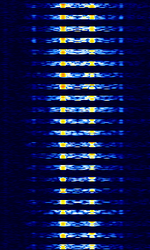 |
||||
| Unknown 13p57 robot-like beeping signal | Unknown beeping signal that has appeared on several broadcast frequencies. Possibly a jammer, but may also be a test transmission or data. | 11.57 MHzMegaHertz (MHz) 10^6 Hz — 21.695 MHzMegaHertz (MHz) 10^6 Hz | 6.7 kHzKiloHertz (kHz) 10^3 Hz | 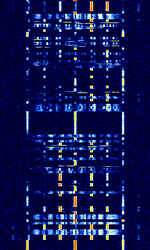 |
||||
| Unknown 142p398 | Posting a unidendified sound. Sound like a MotoTrbo but chopped. Frequency hopping? | 142.399 MHzMegaHertz (MHz) 10^6 Hz | 8 kHzKiloHertz (kHz) 10^3 Hz | 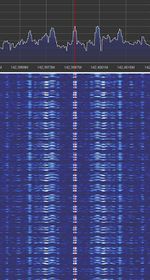 |
||||
| Unknown 148p499MHz, 148p506MHz | Random tones from set of approx 5 | 148 MHzMegaHertz (MHz) 10^6 Hz | 5.579 kHzKiloHertz (kHz) 10^3 Hz | 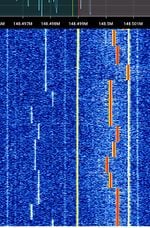 |
||||
| Unknown 14p219 | What appears to be a FSKFrequency-Shift Keying / RTTYRadio TeleTYpe signal with unknown origin... Mark - Space @ 2100 - 1900 HzHertz (Hz), unit of frequency, defined as one cycle per second (1 Hz). from centre frequency. | 14.219 MHzMegaHertz (MHz) 10^6 Hz | 200 HzHertz (Hz), unit of frequency, defined as one cycle per second (1 Hz). |  |
||||
| Unknown 14p986 MFSK-11 | Unknown MSFK-11 transmission. Possibly Russian. | 7.973 MHzMegaHertz (MHz) 10^6 Hz — 14.986 MHzMegaHertz (MHz) 10^6 Hz | 3.3 kHzKiloHertz (kHz) 10^3 Hz | 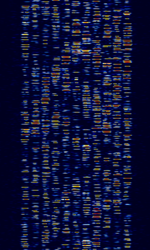 |
||||
| Unknown 151 | Carrier repeats every 4 seconds, signal every 5 seconds. Received in New London County. | 151.195 MHzMegaHertz (MHz) 10^6 Hz | 6 kHzKiloHertz (kHz) 10^3 Hz |  |
||||
| Unknown 154p4635 | 154 HzHertz (Hz), unit of frequency, defined as one cycle per second (1 Hz). | 4 kHzKiloHertz (kHz) 10^3 Hz |  |
|||||
| Unknown 154p46375 | Unknown Data type. Repeats every 20 Mins. Location of RXReceive: De Soto, Jefferson County, MO, 63020 Frequency Licensed to Wildwood Lake POA (Jefferson County). | 154 HzHertz (Hz), unit of frequency, defined as one cycle per second (1 Hz). | 12.5 kHzKiloHertz (kHz) 10^3 Hz | — | ||||
| Unknown 155p5 | I have found an unknown signal at 155.500 Mhz in germany, Hameln near Hannover. This continuously signal has a bandwidth of 15 kHzKiloHertz (kHz) 10^3 Hz. | 155.5 MHzMegaHertz (MHz) 10^6 Hz | 15 kHzKiloHertz (kHz) 10^3 Hz | 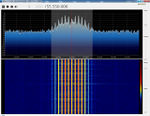 |
||||
| Unknown 155p52 | Unknown modulation, communications relay | 155.52 MHzMegaHertz (MHz) 10^6 Hz | 4.5 MHzMegaHertz (MHz) 10^6 Hz | 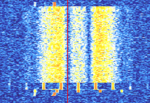 |
||||
| Unknown 155p6 | I added the interesting signal's waterfall image and sound and I record it in Turkey, Central Anatolia. I hope it can be solved | 155.6 MHzMegaHertz (MHz) 10^6 Hz | 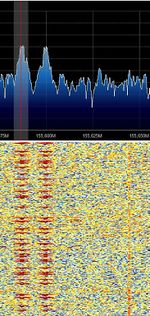 |
|||||
| Unknown 158 | I found this signal on 158.665 MHzMegaHertz (MHz) 10^6 Hz, which according to Industry Canada belongs to our local public works department. | 158.665 MHzMegaHertz (MHz) 10^6 Hz | 0 HzHertz (Hz), unit of frequency, defined as one cycle per second (1 Hz). | 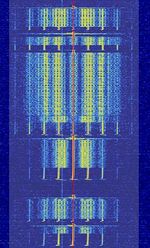 |
||||
| Unknown 15p050 FMCW radar resembles CODAR | Wideband slow-sweeping FMCW radar, somewhat similar to CODAR. Operates outside designated research radar bands. | 7.92 MHzMegaHertz (MHz) 10^6 Hz — 20.8 MHzMegaHertz (MHz) 10^6 Hz | 100 kHzKiloHertz (kHz) 10^3 Hz | 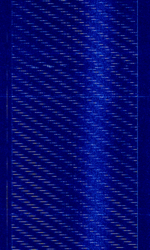 |
||||
| Unknown 161p995 | Noisy signal from Italy. | 161.995 MHzMegaHertz (MHz) 10^6 Hz | 0 HzHertz (Hz), unit of frequency, defined as one cycle per second (1 Hz). | 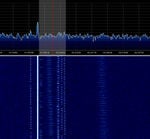 |
||||
| Unknown 163p075 | 163.075 MHzMegaHertz (MHz) 10^6 Hz | 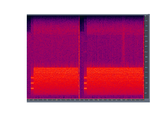 |
||||||
| Unknown 164p3 | Unknown Digital Signal IQQuadrature signals form the basis of complex RF signal modulation and demodulation, both in hardware and in software, as well as in complex signal analysis. File: https://www.dropbox.com/s/tedffkrug9pkbu6/SDRSharp_20171031_182056Z_164373216Hz_IQ.7z?dl=1 | 164.3 MHzMegaHertz (MHz) 10^6 Hz | 15 kHzKiloHertz (kHz) 10^3 Hz | 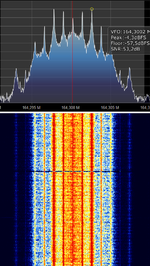 |
||||
| Unknown 167 | I've recieved this signal at 167,400MHz and recorded it as NFMNarrowband Frequency Modulation (Bandwidth 8000). Location: Madrid, Spain. | 167.4 MHzMegaHertz (MHz) 10^6 Hz | 8 kHzKiloHertz (kHz) 10^3 Hz | 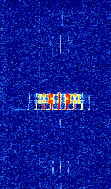 |
||||
| Unknown 168p900 MHz | Some digital signal. Seems to consist of a message and some kind of acknowledge from the receiver (?) | 168.9 MHzMegaHertz (MHz) 10^6 Hz | 25 kHzKiloHertz (kHz) 10^3 Hz | 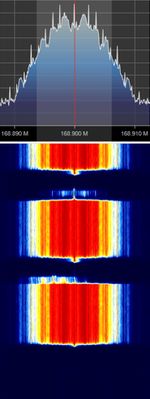 |
||||
| Unknown 16p5 pulsing signal | Unknown, strange pulsing signal. Possibly data or some kind of a radar. | 16.5 MHzMegaHertz (MHz) 10^6 Hz | 3 kHzKiloHertz (kHz) 10^3 Hz | 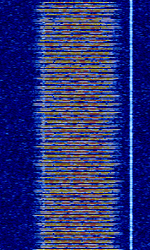 |
||||
| Unknown 171.651600 MHz | short pulses
Possible solution: ACARS transmissions from/to aircraft Sound to me as a kind of SCADA |
171.652 MHzMegaHertz (MHz) 10^6 Hz | 20 kHzKiloHertz (kHz) 10^3 Hz | 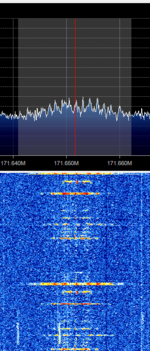 |
||||
| Unknown 172.212 | this signal was picked-up in the south of France neer Spain.
i was at ~50 km from Mediterranean sea and approximately the same distance from the Canigou mountain. my antenas are very small so i can tell that the signal was very strong. |
172 HzHertz (Hz), unit of frequency, defined as one cycle per second (1 Hz). — 212 MHzMegaHertz (MHz) 10^6 Hz | 5 HzHertz (Hz), unit of frequency, defined as one cycle per second (1 Hz). — 3 kHzKiloHertz (kHz) 10^3 Hz | 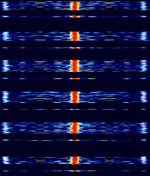 |
||||
| Unknown 173 | 173.262 MHzMegaHertz (MHz) 10^6 Hz | 12 kHzKiloHertz (kHz) 10^3 Hz | 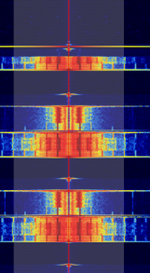 |
|||||
| Unknown 175p4968 | I found this very slow frequency-modulated signal on 175.4968 MHzMegaHertz (MHz) 10^6 Hz. In Belgium, this part of the spectrum is allocated for wireless microphones and audio connections for broadcast services. It might also originate from the Netherlands, as I'm not living far from the border. Every few minutes, the signal shifts up about 500 HzHertz (Hz), unit of frequency, defined as one cycle per second (1 Hz). for a while, before shifting back down. | 175.497 MHzMegaHertz (MHz) 10^6 Hz | 0 HzHertz (Hz), unit of frequency, defined as one cycle per second (1 Hz). |  |
||||
| Unknown 19.07 MHz | Seen around 19 mhz. The signal sometimes has 3 beeps before pulses and has varying intensity. | 19.6 MHzMegaHertz (MHz) 10^6 Hz | 12 kHzKiloHertz (kHz) 10^3 Hz |  |
||||
| Unknown 1p296 | unknown noise or signal? | 1.297 MHzMegaHertz (MHz) 10^6 Hz |  |
|||||
| Unknown 2.42 GHz | Captured on a HackRF, 2.42 GHzGigaHertz (GHz) 10^9 Hz band. | 0 HzHertz (Hz), unit of frequency, defined as one cycle per second (1 Hz). | — | 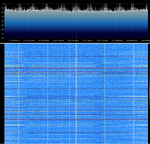 |
||||
| Unknown 20p973 data burst with intro tone | Unidentified data burst with intro tone. Resembles some previously seen data modes. | 20.943 MHzMegaHertz (MHz) 10^6 Hz | 2.9 kHzKiloHertz (kHz) 10^3 Hz | 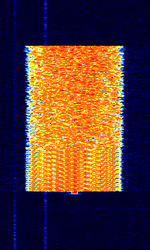 |
||||
| Unknown 218.800 | This is coming from a wastewater management RTU manufactured by Data Flow Systems. Their systems can use communication protocols such as "Modbus ASCII, Modbus RTU, Modbus TCP/IPInternet protocol, Allen Bradley DF1 Serial, Seiscore, Uniface, Motorola Intrac, TAC II Serial, and TAC II TCP/IPInternet protocol." Unknown type of modulation. | 218.8 MHzMegaHertz (MHz) 10^6 Hz | 12.5 kHzKiloHertz (kHz) 10^3 Hz | 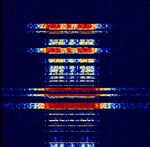 |
||||
| Unknown 220 | Received in New London County. | 220.914 MHzMegaHertz (MHz) 10^6 Hz | 3 kHzKiloHertz (kHz) 10^3 Hz | 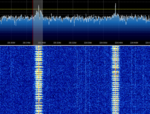 |
||||
| Unknown 236p16 | 236.161 MHzMegaHertz (MHz) 10^6 Hz | 8 kHzKiloHertz (kHz) 10^3 Hz | 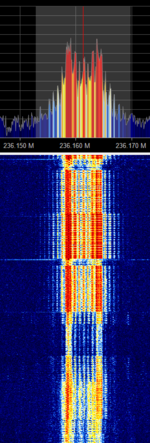 |
|||||
| Unknown 256.235 | — | 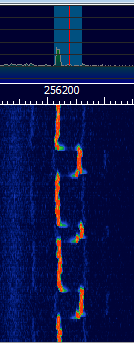 |
||||||
| Unknown 25kHz channel 800 MHz band | Strange 25 kHzKiloHertz (kHz) 10^3 Hz wide signal, possible trunking control or data. | 850 MHzMegaHertz (MHz) 10^6 Hz | 23 kHzKiloHertz (kHz) 10^3 Hz | 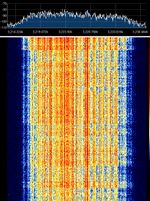 |
||||
| Unknown 270p000 | Sounds like maybe RTTYRadio TeleTYpe or CWContinuous Wave? But I don't notice long vs short tones, albeit the pitch of the tones changes. | 270 MHzMegaHertz (MHz) 10^6 Hz | 270 MHzMegaHertz (MHz) 10^6 Hz | — | ||||
| Unknown 2m signal | Unknown digital signal in the 2m band at several different frequencies | 156.9 MHzMegaHertz (MHz) 10^6 Hz | 20 kHzKiloHertz (kHz) 10^3 Hz |  |
||||
| Unknown 30p745 low VHF band radar with irregular pulse pattern | A low VHFVery High Frequency (30-300 MHz) band signal with more or less irregular pulse pattern. Probably a scientific radar. | 30.745 MHzMegaHertz (MHz) 10^6 Hz | 14 kHzKiloHertz (kHz) 10^3 Hz | 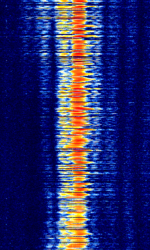 |
||||
| Unknown 33p075 low VHF band data signal | Unknown data signal on the low VHFVery High Frequency (30-300 MHz) band | 17 kHzKiloHertz (kHz) 10^3 Hz | 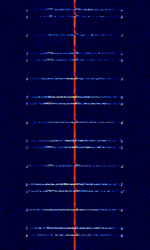 |
|||||
| Unknown 33p36 narrow FMCW radar | Unknown FMCW radar on low VHFVery High Frequency (30-300 MHz) band, 4 kHzKiloHertz (kHz) 10^3 Hz wide, 25 HzHertz (Hz), unit of frequency, defined as one cycle per second (1 Hz). sweep rate | 33.36 MHzMegaHertz (MHz) 10^6 Hz | 4 kHzKiloHertz (kHz) 10^3 Hz | 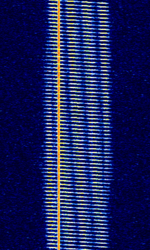 |
||||
| Unknown 36MHz low VHF band radar with pulse pattern | Low VHFVery High Frequency (30-300 MHz) band radar with pulse pattern, transmits groups of three pulses. | 36 MHzMegaHertz (MHz) 10^6 Hz — 36.7 MHzMegaHertz (MHz) 10^6 Hz | 97 kHzKiloHertz (kHz) 10^3 Hz | 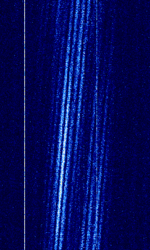 |
||||
| Unknown 38MHz and 35MHz low VHF band radar 94kHz to 100kHz wide | Unknown pulsed radar on the low VHFVery High Frequency (30-300 MHz) band | 38 MHzMegaHertz (MHz) 10^6 Hz | 100 kHzKiloHertz (kHz) 10^3 Hz | 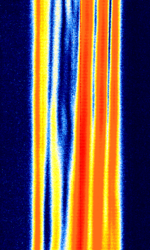 |
||||
| Unknown 3p7875 | Heard this 'digital' transmission on the amateur band and wondered what it was | 3.788 MHzMegaHertz (MHz) 10^6 Hz | 2.5 kHzKiloHertz (kHz) 10^3 Hz | 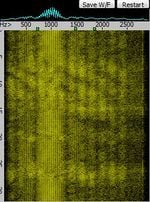 |
||||
| Unknown 4-Note Ascending Signal | Signal likely comes from a transponder of one of several older analog UHFUltra High Frequency (300-3000 MHz) Military communications satellites in the 250 MHzMegaHertz (MHz) 10^6 Hz band, but specific origin is currently not known. Signal emits a set of 11 matching tones with a two second pause before emitting another set with a higher frequency. This is repeated four times before it begins again and seems to be continuous. | 253.821 MHzMegaHertz (MHz) 10^6 Hz — 260.675 MHzMegaHertz (MHz) 10^6 Hz | 9.5 kHzKiloHertz (kHz) 10^3 Hz | 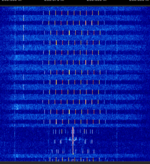 |
||||
| Unknown 40 | Hi,I found a strange signal on 40.693mhz, maybe you know what this is and/or could add this to your sample list. It has a bandwidth of about 4000-5000 hz and the low part repeats about every 2,5 seconds, the high part every 5 seconds (as shown in picture 1 rec1.png). Sometimes (2-3 times an hour) this signal has some variations - show in picture 2 rec2.png. I also provided you an audio sample of about 20 seconds, recorded in RAW. Do you know what this signal could be? Its online 24/7 since a month now. regards, Auge | 409.6 MHzMegaHertz (MHz) 10^6 Hz | 5 kHzKiloHertz (kHz) 10^3 Hz |  |
||||
| Unknown 40 2 | Last Thursday I received some digital signals very close to each other that I have never heard before, it looked like this: http://i.imgur.com/00HQUs3.png and on NFMNarrowband Frequency Modulation it sounded like this: http://picosong.com/PAPC/.It appeared during sporadic E conditions and I heard a lot of people from the UK on the 50MHz band. It could very well be a signal originating from the UK, I received the signal in the south of The Netherlands. | 40 MHzMegaHertz (MHz) 10^6 Hz | 0 HzHertz (Hz), unit of frequency, defined as one cycle per second (1 Hz). | 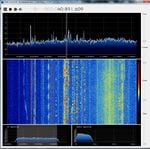 |
||||
| Unknown 40 3 | Sounds like a ringing phone. | 40.672 MHzMegaHertz (MHz) 10^6 Hz | 0 HzHertz (Hz), unit of frequency, defined as one cycle per second (1 Hz). | 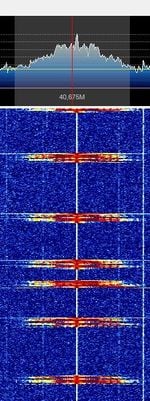 |
||||
| Unknown 405p822 | Obvious bursts, unknown modulation. Long burst heard every 5-10 seconds on average. IQQuadrature signals form the basis of complex RF signal modulation and demodulation, both in hardware and in software, as well as in complex signal analysis. file in description. First thought is some kind of trunking, as it is very close to the band where trunking radio is usually seen. | 405.822 MHzMegaHertz (MHz) 10^6 Hz | 1.5 kHzKiloHertz (kHz) 10^3 Hz |  |
||||
| Unknown 408p719 | Ran rtl-433 analyzer mode over it, got some bitstream output | 408.719 MHzMegaHertz (MHz) 10^6 Hz | 24 kHzKiloHertz (kHz) 10^3 Hz | — | ||||
| Unknown 408p9 | https://youtu.be/tY-Rw5BQRek Observed on Wednesday June 4, 2025 at about 19:11 hours near Taylor, TXTransmit (Austin). Signal appears to form from noise into a coherent short beam with cool harmonics on the side. The long red line is my SDR artifact, sorry. I am using a 100 meter long loop antenna, SAW filter, and small (6x volt/volt) op-amp, NESDR smart v5. | 409 MHzMegaHertz (MHz) 10^6 Hz | 10 kHzKiloHertz (kHz) 10^3 Hz | — | ||||
| Unknown 409 | Unknown chirping like sound. Has BPSKBinary Phase-Shift Keying (1 bit per symbol) modulation, ~600 BdBaud (unit symbol Bd) is the unit for symbol rate or modulation rate in symbols per second. | 409.6 MHzMegaHertz (MHz) 10^6 Hz | 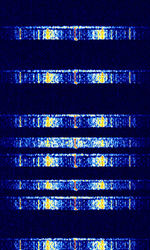 |
|||||
| Unknown 410p0 | IQQuadrature signals form the basis of complex RF signal modulation and demodulation, both in hardware and in software, as well as in complex signal analysis. File & Another recording: https://drive.google.com/open?id=0B1Cfk2C-y-z7aGdmbDd5QVNfNTQ Note that I have no idea what mode to put this in, USBUpper Side Band Modulation (Radio, referring to reception and modulation mode)Universal Serial Bus (Computer, referring to USB Ports and cables) & LSBLower Side Band Modulation sounded the best, so that's what I used. | 410 MHzMegaHertz (MHz) 10^6 Hz | 5 kHzKiloHertz (kHz) 10^3 Hz |  |
||||
| Unknown 414p9 | https://youtu.be/nGMqc-K6hbM Observed on Monday June 2, 2025 at about 23:00 hours near Taylor, TXTransmit (Austin). In the video the long red line is my SDR artifact, sorry. I am using a 100 meter long loop antenna, SAW filter, and small (6x volt/volt) op-amp, NESDR smart v5. | 414 MHzMegaHertz (MHz) 10^6 Hz | 3 kHzKiloHertz (kHz) 10^3 Hz | — |  |
|||
| Unknown 416p49 and 418p69 | https://youtu.be/RZZWy515IhU?si=7odmq_yTS64xczSC There are 2 signals separated by about 2 MHzMegaHertz (MHz) 10^6 Hz, not sure if they are related. Observed on Sunday June 1, 2025 at about 21:30 hours near Taylor, TXTransmit (Austin). The reason I made this post is this signal would slowly drift up in frequency. I went back to look for the signal again after an hour and a half, but I could no locate the signal again. I am using a 100 meter loop antenna, SAW filter, and small (6x) amp. | 416.49 MHzMegaHertz (MHz) 10^6 Hz — 418.72 MHzMegaHertz (MHz) 10^6 Hz | 150 kHzKiloHertz (kHz) 10^3 Hz | — | 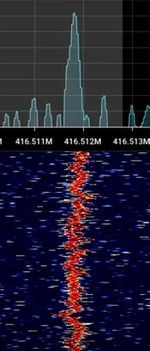 |
|||
| Unknown 417p6 | Observed on Monday June 2, 2025 and Wednesday June 4 near Taylor, TXTransmit (Austin) at the same frequency each day. May also appear at 130MHz. The signal may have up to 2 main lobes and 36 side lobes. The signal drifted about 1kHz between the days it was recorded. I am using a 100 meter long loop antenna, SAW filter, and small (6x volt/volt) op-amp, NESDR smart v5 | 130 MHzMegaHertz (MHz) 10^6 Hz — 417 MHzMegaHertz (MHz) 10^6 Hz | 80 kHzKiloHertz (kHz) 10^3 Hz | — |  |
|||
| Unknown 423p15 | Unknown at 423.15 MHzMegaHertz (MHz) 10^6 Hz. | 423.15 MHzMegaHertz (MHz) 10^6 Hz | 10 kHzKiloHertz (kHz) 10^3 Hz | 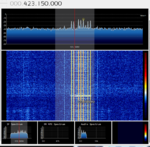 |
||||
| Unknown 433p120 | I found a strange signal on 433.120MHz. Unfortunately I can not read it, so I'm sending it to you. | 433.12 MHzMegaHertz (MHz) 10^6 Hz | 433.12 MHzMegaHertz (MHz) 10^6 Hz | 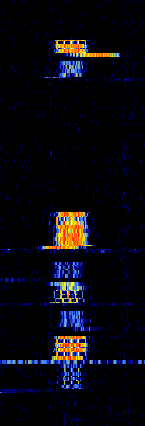 |
||||
| Unknown 434p050 | Appears to be "hammering" (signal interrupted in regular intervals;see iq recording); signal constantly active. | 434.05 MHzMegaHertz (MHz) 10^6 Hz | 16 kHzKiloHertz (kHz) 10^3 Hz | — | 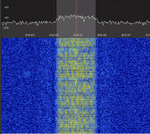 |
|||
| Unknown 434p450 | Maybe FSKFrequency-Shift Keying modulation ?
The transmission is continuous for at least 6-8mn but is not all time continuous (no burst). Earlier the same day i received the same signal on 434.425 MHzMegaHertz (MHz) 10^6 Hz |
434.45 MHzMegaHertz (MHz) 10^6 Hz | 12.5 kHzKiloHertz (kHz) 10^3 Hz | 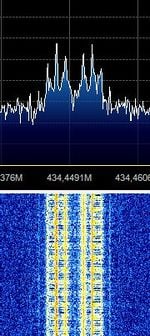 |
||||
| Unknown 434p620 | Posting on behalf of user IfoR. Possible key fob? no description was given. | 434.62 MHzMegaHertz (MHz) 10^6 Hz | ||||||
| Unknown 435p150 Trunking | Please help identify this trunk | — | ||||||
| Unknown 43p525 | Observed on Saturday March 1, 2025 at 21:00 hours near Taylor, TXTransmit (Austin). There is a county airport nearby, and also larger domestic flights are over this location all the time. | 43.525 MHzMegaHertz (MHz) 10^6 Hz | 2 kHzKiloHertz (kHz) 10^3 Hz | — |  |
|||
| Unknown 441p660 | Seems to have disappeared as of writing this edit. Croatian allocation tables point to it being radiolocation. | 441.66 MHzMegaHertz (MHz) 10^6 Hz | 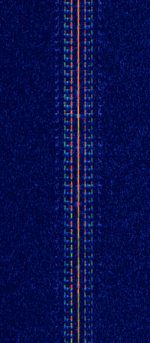 |
|||||
| Unknown 443p685 | Most likely PMR or PAMR according to Croatia's frequency allocation table. | 443.685 MHzMegaHertz (MHz) 10^6 Hz | 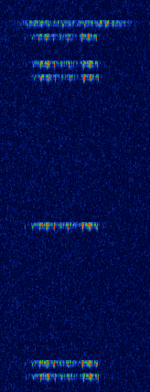 |
|||||
| Unknown 443p886 | 443.886 MHzMegaHertz (MHz) 10^6 Hz |  |
||||||
| Unknown 443p936 | 443.936 MHzMegaHertz (MHz) 10^6 Hz | 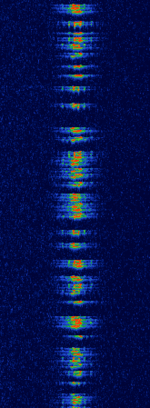 |
||||||
| Unknown 445 | Unknown. Sent from video clip. | 445.363 MHzMegaHertz (MHz) 10^6 Hz | 0 HzHertz (Hz), unit of frequency, defined as one cycle per second (1 Hz). |  |
||||
| Unknown 446 | I've found a strange signal on 446 MHZ Band in Italy, it seems like a multi channel signal (maybe RTTYRadio TeleTYpe?). I'm attaching an image and a 2 seconds IQQuadrature signals form the basis of complex RF signal modulation and demodulation, both in hardware and in software, as well as in complex signal analysis. sample. | 446 MHzMegaHertz (MHz) 10^6 Hz | 0 HzHertz (Hz), unit of frequency, defined as one cycle per second (1 Hz). | 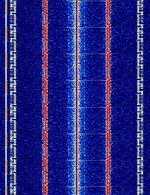 |
||||
| Unknown 449p936 | Some sort of status check between two devices? IQQuadrature signals form the basis of complex RF signal modulation and demodulation, both in hardware and in software, as well as in complex signal analysis. file and detailed pic in the description. | 449.936 MHzMegaHertz (MHz) 10^6 Hz | 7.5 kHzKiloHertz (kHz) 10^3 Hz |  |
||||
| Unknown 451p4500 | Intermittent digital, and occasionally morse code, possibly trunked? | 450 MHzMegaHertz (MHz) 10^6 Hz — 470 MHzMegaHertz (MHz) 10^6 Hz | 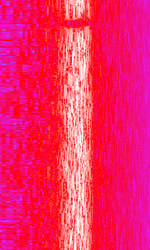 |
|||||
| Unknown 452p862 | 452.863 MHzMegaHertz (MHz) 10^6 Hz | 1.99 kHzKiloHertz (kHz) 10^3 Hz |  |
|||||
| Unknown 455 | 455 MHzMegaHertz (MHz) 10^6 Hz | 0 HzHertz (Hz), unit of frequency, defined as one cycle per second (1 Hz). | 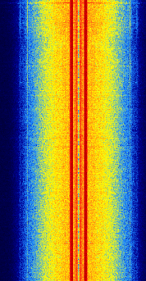 |
|||||
| Unknown 458p208 | Transmitted all the time at roughly 458.208 MHzMegaHertz (MHz) 10^6 Hz (center frequency), in four distinct frequencies separated by about 12.5 KHzKiloHertz (kHz) 10^3 Hz. Each of the signals is roughly 5 KHzKiloHertz (kHz) 10^3 Hz in bandwidth. The signals are received in Portugal near Lisbon. | 458.208 MHzMegaHertz (MHz) 10^6 Hz | 5 kHzKiloHertz (kHz) 10^3 Hz |  |
||||
| Unknown 462.125 | 12.5 kHzKiloHertz (kHz) 10^3 Hz |  |
||||||
| Unknown 464.75 MHz | Common signal found throughout Michigan. Can have various rhythms. Did find out on KB9KUD that this type used for updating transmitter data... | 460 MHzMegaHertz (MHz) 10^6 Hz — 940 MHzMegaHertz (MHz) 10^6 Hz | 10 kHzKiloHertz (kHz) 10^3 Hz | — | 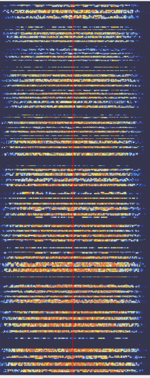 |
|||
| Unknown 465p925 possible bus | Possible bus stop wireless system? | 465.925 MHzMegaHertz (MHz) 10^6 Hz | 10 kHzKiloHertz (kHz) 10^3 Hz | 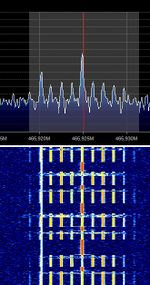 |
||||
| Unknown 467p260 | Found at 467.260 MHzMegaHertz (MHz) 10^6 Hz. First thought to be packet radio but it isn't. | 467.26 MHzMegaHertz (MHz) 10^6 Hz | — | |||||
| Unknown 468p003 | Message coded on 3 to 8 tones. Frequencies changing randomly. Transmitting continuousely | 468 MHzMegaHertz (MHz) 10^6 Hz — 468.005 MHzMegaHertz (MHz) 10^6 Hz | 5 kHzKiloHertz (kHz) 10^3 Hz |  |
||||
| Unknown 469 | Found on 469.975 FMFrequency Modulation on my ICOM HT can't get waterfall cause I don't have my RTL-SDR here. When I'll have a better recording I'll send it. It sounds like the portable traffic lights but it not the same... | 469.975 MHzMegaHertz (MHz) 10^6 Hz | 0 HzHertz (Hz), unit of frequency, defined as one cycle per second (1 Hz). | — | ||||
| Unknown 47p350 | Observed on Wednesday March 5, 2025 at 20:00 hours near Taylor, TXTransmit (Austin). There is a county airport nearby, and also larger domestic flights are over this location all the time. | 47 HzHertz (Hz), unit of frequency, defined as one cycle per second (1 Hz). | 20 kHzKiloHertz (kHz) 10^3 Hz | — | 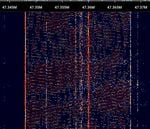 |
|||
| Unknown 47p980 | I was browsing on my SDR when i found this weird signal. It sounds like radar | 47.98 MHzMegaHertz (MHz) 10^6 Hz | 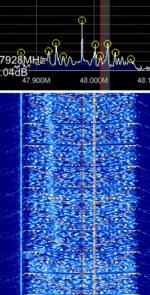 |
|||||
| Unknown 487p001 | 487.001 MHzMegaHertz (MHz) 10^6 Hz | 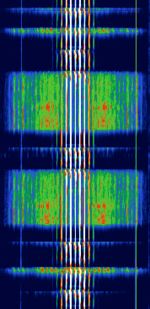 |
||||||
| Unknown 4p18 radar | Unknown radar on the lower HFHigh Frequency (3-30 MHz) band. Vaguely similar to CODAR. | 3.2 MHzMegaHertz (MHz) 10^6 Hz — 4.45 MHzMegaHertz (MHz) 10^6 Hz | 20 kHzKiloHertz (kHz) 10^3 Hz | 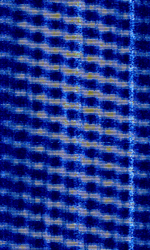 |
||||
| Unknown 4p897 signal with mabye 73 tones | Currently active as of 8/2/2025 at 10:43 PM CDT. | 4.897 MHzMegaHertz (MHz) 10^6 Hz | 3.59 kHzKiloHertz (kHz) 10^3 Hz | 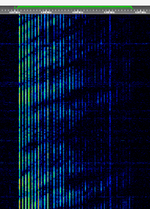 |
||||
| Unknown 504p690 | IQQuadrature signals form the basis of complex RF signal modulation and demodulation, both in hardware and in software, as well as in complex signal analysis. FILE IN DESCRIPTION Signal which looks like a very wide 4MSK, but also has some tones to either side of the 4 main tones. Seen at 22:38 AEST, but not at 22:42 AEST. | 504.625 MHzMegaHertz (MHz) 10^6 Hz | 0 HzHertz (Hz), unit of frequency, defined as one cycle per second (1 Hz). | — |  |
|||
| Unknown 550 | Unknown FSKFrequency-Shift Keying? | 550.06 MHzMegaHertz (MHz) 10^6 Hz | 5 kHzKiloHertz (kHz) 10^3 Hz | 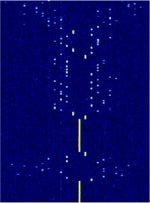 |
||||
| Unknown 648 | Frequency shifting. Received in New London County. | 648.01 MHzMegaHertz (MHz) 10^6 Hz | 300 HzHertz (Hz), unit of frequency, defined as one cycle per second (1 Hz). | 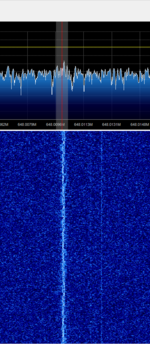 |
||||
| Unknown 6p232 | 6.232 MHzMegaHertz (MHz) 10^6 Hz | 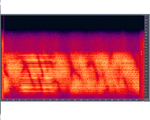 |
||||||
| Unknown 70.208.150 | 70.208 MHzMegaHertz (MHz) 10^6 Hz | — | 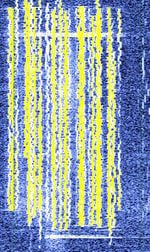 |
|||||
| Unknown 75p219 | Croatian allocation tables point to it being aeronautical radionavigation. Appears every 10 seconds or so. | 75.219 MHzMegaHertz (MHz) 10^6 Hz | 16 kHzKiloHertz (kHz) 10^3 Hz | 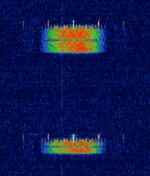 |
||||
| Unknown 78.815 | 78.815 kHzKiloHertz (kHz) 10^3 Hz | 14 kHzKiloHertz (kHz) 10^3 Hz | 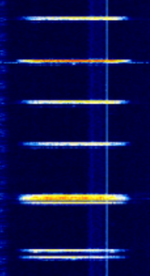 |
|||||
| Unknown 7p1076 | Sounds like an OTHR, but very short bursts? Absolutely no one here. Your signal is actually a Chinese 30-Tone OFDMOrthogonal Frequency-Division Multiplexing Modem | 7.108 MHzMegaHertz (MHz) 10^6 Hz | 2.5 kHzKiloHertz (kHz) 10^3 Hz |  |
||||
| Unknown 7p585 | Possibly OTHOver The Horizon (very long range) radar. | 7.585 MHzMegaHertz (MHz) 10^6 Hz | 9 kHzKiloHertz (kHz) 10^3 Hz | 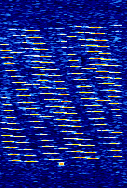 |
||||
| Unknown 7p624 multi-tone data mode resembles CIS modes | Unknown data mode with multiple tones, likely Russian. | 6.162 MHzMegaHertz (MHz) 10^6 Hz — 8.568 MHzMegaHertz (MHz) 10^6 Hz | 3 kHzKiloHertz (kHz) 10^3 Hz | 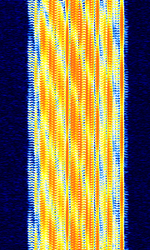 |
||||
| Unknown 8 kHz | This signal occurs many times in a day, at irregular intervals. The shape is always the same, but the length of the center line can vary. | 8 kHzKiloHertz (kHz) 10^3 Hz | 300 HzHertz (Hz), unit of frequency, defined as one cycle per second (1 Hz). | 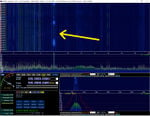 |
||||
| Unknown 83 | Unknown | 83.7 MHzMegaHertz (MHz) 10^6 Hz | 0 HzHertz (Hz), unit of frequency, defined as one cycle per second (1 Hz). |  |
||||
| Unknown 855p537 Chirp | Chirp. Possible FSKFrequency-Shift Keying. No other information. IQQuadrature signals form the basis of complex RF signal modulation and demodulation, both in hardware and in software, as well as in complex signal analysis. file provided. | 855.537 MHzMegaHertz (MHz) 10^6 Hz | 3 kHzKiloHertz (kHz) 10^3 Hz | 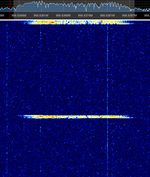 |
||||
| Unknown 856 | The antenna has a Yagi pointed to West from 23.5° South latitude, 47.46° West longitude. The signal can be local or from the sky. The signal is horizontal polarized. | 856 MHzMegaHertz (MHz) 10^6 Hz | 0 HzHertz (Hz), unit of frequency, defined as one cycle per second (1 Hz). | — | 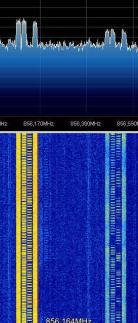 |
|||
| Unknown 85p4748 | I can see the exact same signal with RTL-SDR, HackRF, Airspy, with different computers, so I am ruling out a birdie. The break every 6 seconds is what makes this signal stand out, as something oddball. | 85.475 MHzMegaHertz (MHz) 10^6 Hz | 7 kHzKiloHertz (kHz) 10^3 Hz |  |
||||
| Unknown 869p825 | Signal lasted some minutes with QSB | 869.825 MHzMegaHertz (MHz) 10^6 Hz | — | 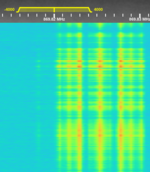 |
||||
| Unknown 869p8255 | Some minutes transmission. Some QSB. | 869.825 MHzMegaHertz (MHz) 10^6 Hz | 10 kHzKiloHertz (kHz) 10^3 Hz | — |  |
|||
| Unknown 86p137 | This signal is emitted constantly every 5 seconds approximately. The power varies constantly. | 86.137 MHzMegaHertz (MHz) 10^6 Hz | 30 kHzKiloHertz (kHz) 10^3 Hz | 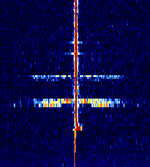 |
||||
| Unknown 877p5 | Possibly a 3G WCDMA signal, although a bit wider than expected. | 887.6 MHzMegaHertz (MHz) 10^6 Hz | 5 MHzMegaHertz (MHz) 10^6 Hz | — |  |
|||
| Unknown 940.113 | Found in Southern Maryland, 30 minutes from Washington, DC | 940.113 MHzMegaHertz (MHz) 10^6 Hz | 17.1 kHzKiloHertz (kHz) 10^3 Hz | 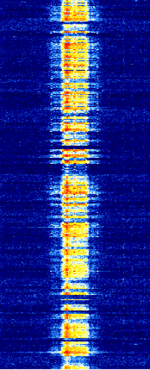 |
||||
| Unknown 941p33 | 941.33 MHzMegaHertz (MHz) 10^6 Hz | 12.5 MHzMegaHertz (MHz) 10^6 Hz |  |
|||||
| Unknown 960.825 - 960.850 | Unknown Signal, no idea what it could be | 906 HzHertz (Hz), unit of frequency, defined as one cycle per second (1 Hz). | 25 kHzKiloHertz (kHz) 10^3 Hz | — | 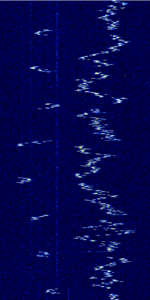 |
|||
| Unknown @73.728 Mhz | Received on Funcube Pro+ with standard VHFVery High Frequency (30-300 MHz) TV antenna pointing due West. Sound is on 73.7267 MHzMegaHertz (MHz) 10^6 Hz and does not vary over time. | 0 HzHertz (Hz), unit of frequency, defined as one cycle per second (1 Hz). | 10.07 kHzKiloHertz (kHz) 10^3 Hz | No Audio File | 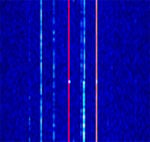 |
|||
| Unknown Chirping 2 | Continuous bursts. Audio sample recorded in NFMNarrowband Frequency Modulation. Comment: Transmitted by a company that has water purifiers near my city. I know because i’ve done 2 stages in this company and i’ve seen the radio. It should recive the water level from the tanks and other things. | 162.863 MHzMegaHertz (MHz) 10^6 Hz — 936 MHzMegaHertz (MHz) 10^6 Hz | 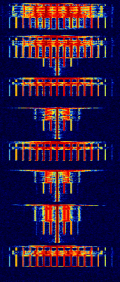 |
|||||
| Unknown Constant signal on 331.776 Mhz | This is a constant quickly beeping signal.
There does not seem to be any form of scheduling or pattern. I've heard the signal many times, but have yet to figure out it's purpose or source. |
331.776 MHzMegaHertz (MHz) 10^6 Hz | 2.26 kHzKiloHertz (kHz) 10^3 Hz | 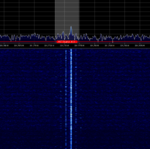 |
||||
| Unknown DMR Signal | an unidentified DMR signal , transmitting continously with nearly constant intervals , each cycle is around one second , DSD+ shows it as Tier3(TIII) but no sound even when there is an acvtivity , the signal is not encrypted | 450.175 MHzMegaHertz (MHz) 10^6 Hz | 12.5 kHzKiloHertz (kHz) 10^3 Hz | 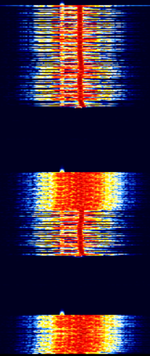 |
||||
| Unknown Data Chirping | Continuous signal. Audio sample recorded in NFMNarrowband Frequency Modulation. | 152.652 MHzMegaHertz (MHz) 10^6 Hz | 0 HzHertz (Hz), unit of frequency, defined as one cycle per second (1 Hz). |  |
||||
| Unknown Data Transmission | Unable to identify this transmission. It was found in Hawaiian airspace operating on band reserved for military transmissions. Some sort of FSKFrequency-Shift Keying? Bears resemblance to Unknown 707. | 375 MHzMegaHertz (MHz) 10^6 Hz | 2 kHzKiloHertz (kHz) 10^3 Hz |  |
||||
| Unknown Digital | Digital signal recorded on sdr++ with QFH 137 antenna | 159.61 MHzMegaHertz (MHz) 10^6 Hz | 10 kHzKiloHertz (kHz) 10^3 Hz | 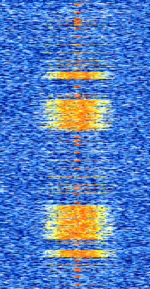 |
||||
| Unknown Digital Signal on HF | Unknown digital mode on HFHigh Frequency (3-30 MHz). Broadcasting on 11.016Mhz. Transmits 24/7. Some fading in the signal, but consistent day and night. Must be transmitting from Georgia or neighboring state. | 11.016 MHzMegaHertz (MHz) 10^6 Hz | 3 kHzKiloHertz (kHz) 10^3 Hz | 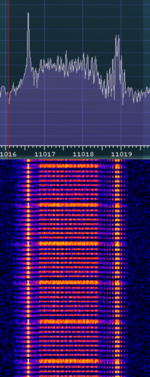 |
||||
| Unknown Digital on 2m | 167 MHzMegaHertz (MHz) 10^6 Hz | 16 HzHertz (Hz), unit of frequency, defined as one cycle per second (1 Hz). | — | |||||
| Unknown FSK 434.325M | 434.325 MHzMegaHertz (MHz) 10^6 Hz | 10 kHzKiloHertz (kHz) 10^3 Hz |  |
|||||
| Unknown FSK Blips | I see what looks like some sort of AFSKAudio Frequency-Shift Keying all over 454MHz (looks like several channels of it). Most of the time it's the short bursts as can be seen in the waterfall, but occasionally it breaks out into a much longer ramble. It also sounds as though the carrier drifts up and down a bit during these longer bursts. In AMAmplitude Modulation or FMFrequency Modulation, it just sounds like someone keying a mic every second, but on sideband it sounds much more interesting, like the attached file. Cheers | 454 MHzMegaHertz (MHz) 10^6 Hz |  |
|||||
| Unknown Ham Signal | All found on the 20m band. Radio frequency's are 14.109, 14.166, 14.224, and 14.340. I'm in the Los Angeles, California area. | 14.109 MHzMegaHertz (MHz) 10^6 Hz — 14.34 MHzMegaHertz (MHz) 10^6 Hz |  |
|||||
| Unknown Heli | Submitted on behalf of Willone2. Some sweeper | 6.31 MHzMegaHertz (MHz) 10^6 Hz |  |
|||||
| Unknown Helix | Helix shape possibly due to under sampling in the waterfall display? | 456.368 MHzMegaHertz (MHz) 10^6 Hz | 0 HzHertz (Hz), unit of frequency, defined as one cycle per second (1 Hz). |  |
||||
| Unknown MFSK on 128KHz | A very strong MFSKMultiple Frequency Shift-Keying-like signal | 118 kHzKiloHertz (kHz) 10^3 Hz — 128 kHzKiloHertz (kHz) 10^3 Hz | 16 kHzKiloHertz (kHz) 10^3 Hz |  |
||||
| Unknown MFSK on 12916kHz | 12.916 MHzMegaHertz (MHz) 10^6 Hz | 2.5 kHzKiloHertz (kHz) 10^3 Hz |  |
|||||
| Unknown Marine Band 157.740 | 157.74 MHzMegaHertz (MHz) 10^6 Hz, 157.74 MHzMegaHertz (MHz) 10^6 Hz | — | — | |||||
| Unknown Numbers Station 4p723 | Numbers station heard 12:26 AMAmplitude Modulation AEST on 2015-01-19. Delivers a stream of numbers and letters in phonetics. Begins with "All stations, all stations, this is ?". Finishes with "This is ? out". Cannot hear it myself - anyone else have better ears? | 4.723 MHzMegaHertz (MHz) 10^6 Hz | 4 kHzKiloHertz (kHz) 10^3 Hz |  |
||||
| Unknown Out of Band ISM | 'Out of Band (Australia)' Unidentified digital wideband signal seems to have origins in the US ISM band - Shouldn't be below 915MHz Downunder! | 900 MHzMegaHertz (MHz) 10^6 Hz | 10 MHzMegaHertz (MHz) 10^6 Hz | — |  |
|||
| Unknown Pager | Sounds like a pager system | 471.688 MHzMegaHertz (MHz) 10^6 Hz | 12.5 kHzKiloHertz (kHz) 10^3 Hz |  |
||||
| Unknown Pear | Here was a pear shape happened 3 times tonight.Sorry to say I didn`t get the audio. I was lucky to get 2 images. | — | 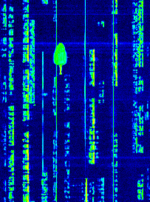 |
|||||
| Unknown Pulse Tones - 3012.001 MHz | 2019-06-14 01:02 UTC
Detected several pulse tones from an unknown signal in SHF range 3011.999 to 3012.001 MHzMegaHertz (MHz) 10^6 Hz. Captured signal via HackRF located in San Antonio, Texas, United States. |
3,011.999 MHzMegaHertz (MHz) 10^6 Hz — 3,012.001 MHzMegaHertz (MHz) 10^6 Hz | 2.4 kHzKiloHertz (kHz) 10^3 Hz | 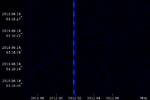 |
||||
| Unknown Pulsing | Periodic pulses. Sound sample recorded in USBUpper Side Band Modulation (Radio, referring to reception and modulation mode)Universal Serial Bus (Computer, referring to USB Ports and cables) mode. Possibly a GlobeWireless signal. | 6 MHzMegaHertz (MHz) 10^6 Hz | 0 HzHertz (Hz), unit of frequency, defined as one cycle per second (1 Hz). |  |
||||
| Unknown Pulsing Signal | An overpowering signal at 149.5mhz in North Potomac, Maryland, USA | 149 HzHertz (Hz), unit of frequency, defined as one cycle per second (1 Hz). | 150 MHzMegaHertz (MHz) 10^6 Hz | 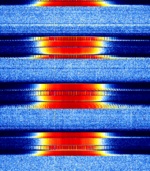 |
||||
| Unknown Pulsing Sound | 462 MHzMegaHertz (MHz) 10^6 Hz | 5 HzHertz (Hz), unit of frequency, defined as one cycle per second (1 Hz). — 350 HzHertz (Hz), unit of frequency, defined as one cycle per second (1 Hz). | — | |||||
| Unknown Pulsing Type of Signal | 7.404 kHzKiloHertz (kHz) 10^3 Hz — 7.438 MHzMegaHertz (MHz) 10^6 Hz | 4 kHzKiloHertz (kHz) 10^3 Hz | — |  |
||||
| Unknown RADAR Near Toronto Canada | I found this RADAR signal in the expected band, however all other nearby RADAR units were already identified. This one is unknown, and uses a novel inter-pulse modulation scheme and seemingly random or pseudo-random pulse train and pulse coding. | 1,350 MHzMegaHertz (MHz) 10^6 Hz | 2 MHzMegaHertz (MHz) 10^6 Hz |  |
||||
| Unknown Radar | I often see this signal, and it lasts for literal hours. It sounds very similar to a microwave running, and looks as if Kontayner had a little brother. It's a strong signal, but not as strong as the PLUTO radar. | 4.41 MHzMegaHertz (MHz) 10^6 Hz | 7 kHzKiloHertz (kHz) 10^3 Hz | 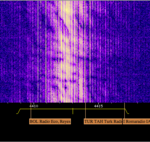 |
||||
| Unknown Ringing | Repeats every minute. | 154.646 MHzMegaHertz (MHz) 10^6 Hz | 0 HzHertz (Hz), unit of frequency, defined as one cycle per second (1 Hz). | 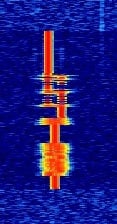 |
||||
| Unknown Signal | Continued transmission, received with SDRplay and RTL-SDR | 459.6 MHzMegaHertz (MHz) 10^6 Hz | 150 kHzKiloHertz (kHz) 10^3 Hz | 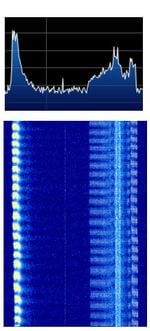 |
||||
| Unknown Signal 433p5MHz | The signal repeatedly appeared and disappeared ever few minutes. It might be from a mixer trucke, that was in front of my window. | 433.5 MHzMegaHertz (MHz) 10^6 Hz | 20 kHzKiloHertz (kHz) 10^3 Hz |  |
||||
| Unknown Signal 940.863 MHz | Digital BOS Radio system transmissions from Germany. | 940.863 MHzMegaHertz (MHz) 10^6 Hz | 10 kHzKiloHertz (kHz) 10^3 Hz | 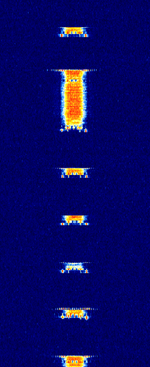 |
||||
| Unknown Signal @ 940.113.970 MHz | Found fairly close to the other one I found, I'm going to say that this is probably some type of pager | 940.113 MHzMegaHertz (MHz) 10^6 Hz | 22.28 kHzKiloHertz (kHz) 10^3 Hz |  |
||||
| Unknown Signal at 695 MHz | Please find signal IQQuadrature signals form the basis of complex RF signal modulation and demodulation, both in hardware and in software, as well as in complex signal analysis. file at : https://1drv.ms/u/s!AvlNmSqrGlNVgWol9WapK9zRMIJu | 695 MHzMegaHertz (MHz) 10^6 Hz | — | — | ||||
| Unknown Signal at 7443 mhz | unknown signal sounds like spaceship | 7.443 kHzKiloHertz (kHz) 10^3 Hz | 2 kHzKiloHertz (kHz) 10^3 Hz | — | 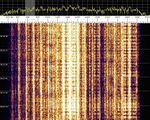 |
|||
| Unknown Telemetry | 465.188 MHzMegaHertz (MHz) 10^6 Hz | 12.5 MHzMegaHertz (MHz) 10^6 Hz |  |
|||||
| Unknown Trunking | Sounds like Motorola Type II smartnet, but Unitrunker does not recognize. | 452.325 MHzMegaHertz (MHz) 10^6 Hz | 0 HzHertz (Hz), unit of frequency, defined as one cycle per second (1 Hz). | 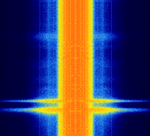 |
||||
| Unknown Trunking or Telemetry | Control channel for a logic trunked radio system. | 148 MHzMegaHertz (MHz) 10^6 Hz — 170 MHzMegaHertz (MHz) 10^6 Hz | 12 kHzKiloHertz (kHz) 10^3 Hz | 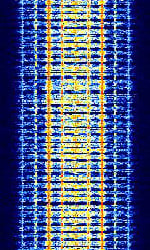 |
||||
| Unknown UHF Satcom Signal | So I've come across this signal twice now - the first time I assumed it might've been an anomaly however it's popped up again and this time stronger and with similar signals nearby. I've seen it between 250 and 270 MHzMegaHertz (MHz) 10^6 Hz on it's own and next to the same type of signal but with different "waves" in the transmission. It sits right next to the classic UHFUltra High Frequency (300-3000 MHz) satcom signals however this one has obvious differences. Unsure what modulation it is. The first thing I thought of was some kind of radar but I don't know of any in this band. | 251 HzHertz (Hz), unit of frequency, defined as one cycle per second (1 Hz). | 30 kHzKiloHertz (kHz) 10^3 Hz | 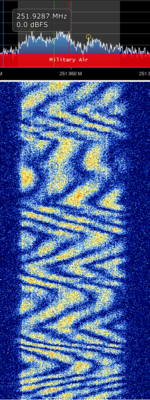 |
||||
| Unknown UHF in SARSAT Band | 406.05 MHzMegaHertz (MHz) 10^6 Hz | 10 kHzKiloHertz (kHz) 10^3 Hz | 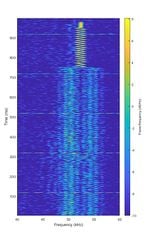 |
|||||
| Unknown VHF burst | This is a signal I couldn't identify. I got two bursts and took away the noise between them in Audacity so they'd play back-to-back. | 159.18 MHzMegaHertz (MHz) 10^6 Hz |  |
|||||
| Unknown at 164.650MHz | Possibly some kind of radio trunking. | 164.65 MHzMegaHertz (MHz) 10^6 Hz | 5 kHzKiloHertz (kHz) 10^3 Hz | |||||
| Unknown blips 447p325 | Always active, seems to come from multiple sources as blips. Telemetry of some sort? | 447.325 MHzMegaHertz (MHz) 10^6 Hz | 20 kHzKiloHertz (kHz) 10^3 Hz | 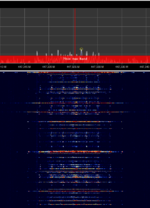 |
||||
| Unknown chirps | lot of tone chirps 750 MHzMegaHertz (MHz) 10^6 Hz. submitted by user Mitchy93 | 750 MHzMegaHertz (MHz) 10^6 Hz | 15 kHzKiloHertz (kHz) 10^3 Hz | 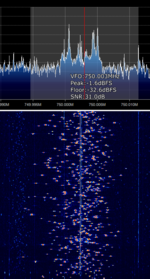 |
||||
| Unknown codar | This signals looks and sounds exactly like CODAR. It has a higher sweep rate than the one on 13500kHz | 26.2 MHzMegaHertz (MHz) 10^6 Hz | 150 kHzKiloHertz (kHz) 10^3 Hz | — | 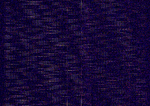 |
|||
| Unknown digi mode | An unknown digital mode consisting of maybe PSKPhase-Shift Keying and freq hopping FSKFrequency-Shift Keying bursts within the signal. No one at the moment know what it is. Went off the air around 21:45 UTC on 8/14/17. further observation concludes that it might be on a steady schedule. Don't know when it first went on air. ( MORE UPDATES IN THE PAGE) | 6.903 kHzKiloHertz (kHz) 10^3 Hz — 11.017 MHzMegaHertz (MHz) 10^6 Hz | 3.5 kHzKiloHertz (kHz) 10^3 Hz | 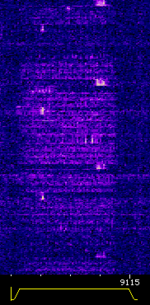 |
||||
| Unknown digital 461p185 | 461.185 MHzMegaHertz (MHz) 10^6 Hz | 12.5 kHzKiloHertz (kHz) 10^3 Hz | — | |||||
| Unknown digital signal in italy | 446.524 MHzMegaHertz (MHz) 10^6 Hz — 447.275 MHzMegaHertz (MHz) 10^6 Hz | — | 150px | |||||
| Unknown lf strong signal | 82 kHzKiloHertz (kHz) 10^3 Hz | 1 kHzKiloHertz (kHz) 10^3 Hz |  |
|||||
| Unknown marine VHF 161.300 | Sounds like FSKFrequency-Shift Keying every minute in marine VHFVery High Frequency (30-300 MHz) band near north west coast of France | 161.3 MHzMegaHertz (MHz) 10^6 Hz | 12 kHzKiloHertz (kHz) 10^3 Hz | 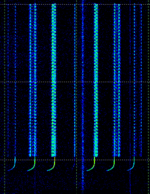 |
||||
| Unknown military airwaves signal 334.520 MHz | Observed and recorded 23 June 2022 02:00-03:00 PST (23 June 2022 09:00-10:00 UTC) | 334.52 MHzMegaHertz (MHz) 10^6 Hz | 4 kHzKiloHertz (kHz) 10^3 Hz |  |
||||
| Unknown modulating carrier and sidebands | Pulsing signal at 228 MHzMegaHertz (MHz) 10^6 Hz, with sidebands spaced at 22.75 kHzKiloHertz (kHz) 10^3 Hz. Carrier appears to pulse at ~1.33 HzHertz (Hz), unit of frequency, defined as one cycle per second (1 Hz). | 0 HzHertz (Hz), unit of frequency, defined as one cycle per second (1 Hz). | 140 kHzKiloHertz (kHz) 10^3 Hz | — | ||||
| Unknown moving signal | i dont know what is this,its moving to another frequencies slowly, so i can follow the signal, sometimes its weak becouse im changing my antenna position for better results, signal is being really strong if i change antenna's position to moon(i know this signal cant came from moon, and i hope)i dont know the frequency range becouse i closed app while receiving i dont wanted to listen whole signal(start:2750kHz stop:i dont know but i think 5MHz or little bit more) | 2.75 MHzMegaHertz (MHz) 10^6 Hz | 2.8 kHzKiloHertz (kHz) 10^3 Hz | — | ||||
| Unknown narrow data on 18050kHz | Unidentified narrow data mode | 18.051 MHzMegaHertz (MHz) 10^6 Hz | 2 kHzKiloHertz (kHz) 10^3 Hz | 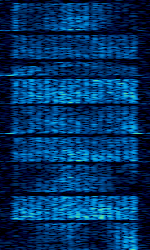 |
||||
| Unknown noise signal in 19m broadcast band | Strange noisy signal on 19 meter broadcast band | 15.16 MHzMegaHertz (MHz) 10^6 Hz | 10 kHzKiloHertz (kHz) 10^3 Hz | 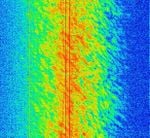 |
||||
| Unknown paging 940p862 | Unknown paging signal, similar to FLEX in preamble tone but doesnt decode as FLEX. 1600Bd, possible PSKPhase-Shift Keying. | 940.862 MHzMegaHertz (MHz) 10^6 Hz | 12 kHzKiloHertz (kHz) 10^3 Hz | 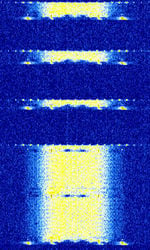 |
||||
| Unknown pulses | Hi. an unknown irregular pulses transmitting on 36.941 Mhz 24/7. Received by a RTL-SDR and a simple 10 meter long wire. signal is powerful all the time. | 36.941 MHzMegaHertz (MHz) 10^6 Hz | 10 kHzKiloHertz (kHz) 10^3 Hz | 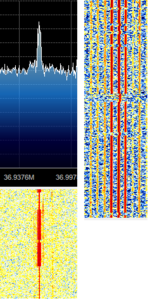 |
||||
| Unknown signal at 444p019143 | I'm new to radio and I've just found this signal. There are a few similar other signals around this one. | 444.019 MHzMegaHertz (MHz) 10^6 Hz | 6 kHzKiloHertz (kHz) 10^3 Hz | 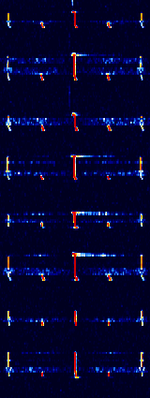 |
||||
| Unknown signal between 424.000MHz and 425.000MHz | Unknown signal in Belgium between 424 and 425MHz. Permanent data stream. | 424.513 MHzMegaHertz (MHz) 10^6 Hz — 424.8 MHzMegaHertz (MHz) 10^6 Hz | 15 HzHertz (Hz), unit of frequency, defined as one cycle per second (1 Hz). |  |
||||
| Unknown signal via 464.6 MHz | This is actually a time signal listed to a time code company in GR but the form of modulation is confusing.... | 464.6 MHzMegaHertz (MHz) 10^6 Hz | 5.4 kHzKiloHertz (kHz) 10^3 Hz | 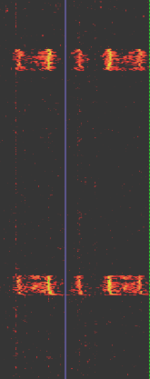 |
||||
| Unknown tone on MURS 154.600 | Unknown tones appearing on MURS 154.6000MHz. Numerous videos and a post on RadioReference.com show listeners in different parts of the country have also heard the same tone on the same frequency. | 154.6 MHzMegaHertz (MHz) 10^6 Hz | 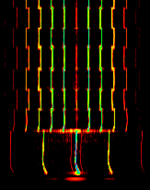 |
|||||
| Unknown trnking | unknown trunking channel signal | 173 MHzMegaHertz (MHz) 10^6 Hz | 8 kHzKiloHertz (kHz) 10^3 Hz | 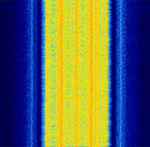 |
||||
| Unknown trunk | Unidentified (Police?) trunked radio signal in Santa Rosa, CA | 0 HzHertz (Hz), unit of frequency, defined as one cycle per second (1 Hz). | No Audio File | 150px | ||||
| Unknown trunking or data | Unidentified data signal, possibly trunking | 131.188 MHzMegaHertz (MHz) 10^6 Hz | 12.5 kHzKiloHertz (kHz) 10^3 Hz | 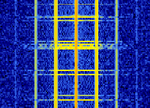 |
||||
| Unknown weird MFSK or broken transmitter 16.8MHz | Weird signal that changed modes. Maybe a broken transmitter. | 16.807 MHzMegaHertz (MHz) 10^6 Hz | 200 HzHertz (Hz), unit of frequency, defined as one cycle per second (1 Hz). — 1.7 kHzKiloHertz (kHz) 10^3 Hz | 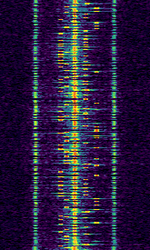 |
||||
| Unknown-1536125 | This signal continuously broadcasts in short blips. | 151.782 MHzMegaHertz (MHz) 10^6 Hz — 469.761 MHzMegaHertz (MHz) 10^6 Hz | 10 kHzKiloHertz (kHz) 10^3 Hz |  |
||||
| Unknown-162 | Signal was captured in Belarus(near Russia border). It is emitting everytime. Maybe this is airport signals... | 162.3 MHzMegaHertz (MHz) 10^6 Hz | 12.5 kHzKiloHertz (kHz) 10^3 Hz | 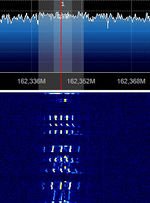 |
||||
| Unknown72p00Mhz | A repeating short data transmission. | 72 MHzMegaHertz (MHz) 10^6 Hz — 72.36 MHzMegaHertz (MHz) 10^6 Hz | 8 kHzKiloHertz (kHz) 10^3 Hz | — | ||||
| Unkown 0p012 | Unknown VLFVery Low Frequency (3-30 kHz) signal ~12.5 kHzKiloHertz (kHz) 10^3 Hz. Interference every 10-30 minutes: 2-3 ~12.5 KHzKiloHertz (kHz) 10^3 Hz tones, separated by approximately a second. | 12.5 kHzKiloHertz (kHz) 10^3 Hz | 24 kHzKiloHertz (kHz) 10^3 Hz | |||||
| Unkown 13p559 USB Mode | This signal appears at night and disappears in the morning in China. It's strong and no one knows what it is for. | 13.559 MHzMegaHertz (MHz) 10^6 Hz | 1.25 kHzKiloHertz (kHz) 10^3 Hz | 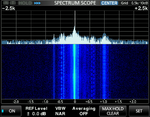 |
||||
| Unkown 156p00 | I think this is a pager signal, but would like to know what type of signal it is please | 156 MHzMegaHertz (MHz) 10^6 Hz | 0 HzHertz (Hz), unit of frequency, defined as one cycle per second (1 Hz). | — | ||||
| Unkown 707p999 FSK | 707.999 MHzMegaHertz (MHz) 10^6 Hz | 11 kHzKiloHertz (kHz) 10^3 Hz | — | 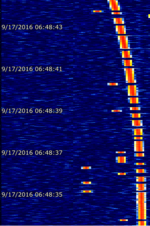 |
||||
| Unkown Periodic Signal | Unknown periodic signal around 94.5 kHzKiloHertz (kHz) 10^3 Hz | 94.5 kHzKiloHertz (kHz) 10^3 Hz | 500 HzHertz (Hz), unit of frequency, defined as one cycle per second (1 Hz). |  |
||||
| Unkown Periodic Signal | Unknown periodic signal around 94.5 kHzKiloHertz (kHz) 10^3 Hz | 94.5 kHzKiloHertz (kHz) 10^3 Hz | 500 HzHertz (Hz), unit of frequency, defined as one cycle per second (1 Hz). |  |
||||
| Unkown patteren at 434.750 MHz | signal seems to be in some sort of patteren but it's isn't regular sometimes it stops and continues again after a while. while it pauses you can also faintly hear another signal at the smae time. the audio recorded was in RAW mode | 434.75 MHzMegaHertz (MHz) 10^6 Hz |  |
|||||
| Unkown radar-like signal on 70cm band | Found this signal interfering with the IO-117 satellite download at 435.1MHz. | 435.3 MHzMegaHertz (MHz) 10^6 Hz | 100 kHzKiloHertz (kHz) 10^3 Hz | — | 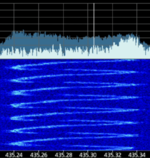 |
|||
| VC02 voice Morse code station | Chinese VC02 voice Morse code station. This station transmits voice Morse code messages by vocalizing the "dits" and "dahs." | 9.962 MHzMegaHertz (MHz) 10^6 Hz |  |
|||||
| WLAN Interfering with Bluetooth | A WLAN signal interfering with a Bluetooth signal. | — | — | |||||
| WOMEX | Found on the 20 meter amateur band in Hayward, CA as seen on an ICOM 7300 | 14.15 MHzMegaHertz (MHz) 10^6 Hz | 2 kHzKiloHertz (kHz) 10^3 Hz | — | 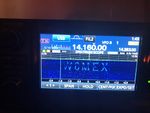 |
|||
| Water Tower Com to water pumps | Telemetry data for water pumps & water towers for water distribution. | 447.238 MHzMegaHertz (MHz) 10^6 Hz — 457.438 MHzMegaHertz (MHz) 10^6 Hz | 12.5 kHzKiloHertz (kHz) 10^3 Hz | 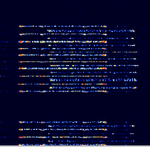 |
||||
| Water plant telemetry | It is received all over Hungary, on many frequencies in the given range. Some of them are simplex, some half-duplex. It's telemetry from water plants/pumps/etc. They are working with 10 or 10+ element yagi antennas. | 440 MHzMegaHertz (MHz) 10^6 Hz — 460 MHzMegaHertz (MHz) 10^6 Hz | 12 HzHertz (Hz), unit of frequency, defined as one cycle per second (1 Hz). — 5 kHzKiloHertz (kHz) 10^3 Hz | 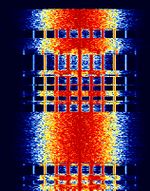 |
||||
| Weird Signal at 6912.43 | This looked like a STANAGNATO Standardization Agreement (STANAG), defines processes, procedures, terms, and conditions for common military or technical procedures or equipment between the member countries of the North Atlantic Treaty Organization (NATO). signal but when I went to investigate further it sounded like a STANAGNATO Standardization Agreement (STANAG), defines processes, procedures, terms, and conditions for common military or technical procedures or equipment between the member countries of the North Atlantic Treaty Organization (NATO). on LSD. | 6.912 kHzKiloHertz (kHz) 10^3 Hz | 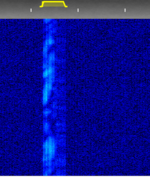 |
|||||
| Weird Signal on Multiple Frequencies | For some reason I've been scanning frequencies and this has come up on about 10 of them. Anyone know what this is? | 0 HzHertz (Hz), unit of frequency, defined as one cycle per second (1 Hz). | [[Image: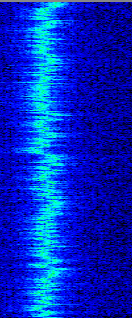 |150px]] |150px]] |
|||||
| Weird moving signal | Found this signal while just scanning around. Original thought it could be something to do with the local airport, such as radar or something. But this signal has only appeared in the last couple of days. | 117 MHzMegaHertz (MHz) 10^6 Hz | 3 kHzKiloHertz (kHz) 10^3 Hz | — | 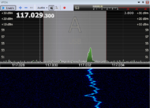 |
|||
| Weird pulsing | Just found this while i was looking through a WebSDR (http://websdr.ewi.utwente.nl:8901) | 13.55 MHzMegaHertz (MHz) 10^6 Hz | 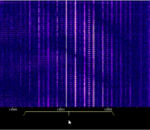 |
|||||
| Weird signal on 10321.5 khz | 2.5 kHzKiloHertz (kHz) 10^3 Hz |  |
||||||
| Weird signal on military frequency | I found this weird signal, bouncing around the frequency. Anyone know what this is? | 232.56 MHzMegaHertz (MHz) 10^6 Hz | — |  |
||||
| Weird spikes | Odd spikes found when scanning | 888 MHzMegaHertz (MHz) 10^6 Hz — 893 MHzMegaHertz (MHz) 10^6 Hz | 24.5 kHzKiloHertz (kHz) 10^3 Hz | 150px | ||||
| Wide signal at 443.5 MHz | 443.5 MHzMegaHertz (MHz) 10^6 Hz | 125 kHzKiloHertz (kHz) 10^3 Hz | — | 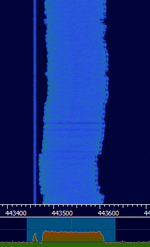 |
||||
| Wideband noise centred on 14030kHz | Wideband noise, 15dB above usual noise floor, centred on 14.030 MHzMegaHertz (MHz) 10^6 Hz and repeated every 400 kHzKiloHertz (kHz) 10^3 Hz for dozens of MHzMegaHertz (MHz) 10^6 Hz either side of main signal. It is there 24/7 and only received when antenna connected to SDR . | 14.03 MHzMegaHertz (MHz) 10^6 Hz | 30 kHzKiloHertz (kHz) 10^3 Hz |  |
||||
| Wireless Microphone | Just randomly saw it and though it was a normal amateur but it has been going for 1 hour straight It's not FMFrequency Modulation interference . I have terrible signal or BBC radio so it is definitely not FMFrequency Modulation interference | 442.274 MHzMegaHertz (MHz) 10^6 Hz | 11 kHzKiloHertz (kHz) 10^3 Hz | 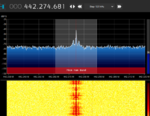 |
||||
| WmBus | 868.33 MHzMegaHertz (MHz) 10^6 Hz | — | 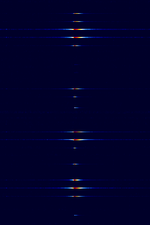 |
|||||
| ФГКТ (6970 kHz) | 6970 kHzKiloHertz (kHz) 10^3 Hz is a supposed Russian military station apparently broadcasting from the Naro-Fominsk region of Russia, which is also the Western Military District region. The station broadcasts Monolith voice messages every day at 17:45 UTC, with a similar format as "The Pip". The station uses the callsign ФГКТ (FGKT). | 6.97 MHzMegaHertz (MHz) 10^6 Hz | 3 kHzKiloHertz (kHz) 10^3 Hz | — | — |